#cause throughout the show hes your standard evil villain
Explore tagged Tumblr posts
Text
Ngl the episode with Dani's return in Danny Phantom really makes me more annoyed that A Glitch In Time really went and tried to redeem Vlad.
#and dark danny#but like mainly annoyed with vlad#cause throughout the show hes your standard evil villain#whose obsessed with maddie who he cannot have#and then danny who he also cannot have#he basically does alot of evil shit#and the whole finale is him going beyond redemption#but when it comes to dani you got him cloning danny constantly until he does finally get dani#but instead of just focusing on creating a family with her#he still obsesses over danny#and basically is fine with the idea of disgarding her if he succeeds at cloning danny#and literally was fine with telling her to overshadow danny#despite knowing it would kill her and she obviously doesnt want to die#and in her return episode basically wants her captured so he can disect her and make a perfect clone#and dont care about her even when shes dying basically#hell in this episode we see she has trauma from her debut episode#having to reassure herself vlad isnt here#like how the fuck did the book think vlad was redeemable again#no wonder dani didnt appear in the book#the book would either be barf inducing with forcing her to forgive him or...actually thats it#it'd be bad#and dont get me started on trying to redeem dark danny#just...why the fuck did the villains need redeeming in this book...
9 notes
·
View notes
Note
Hey there :) I love your metas and would like to know why you think they decided to show satan as an actual being, but not god? Or do you think we will see god in the final episode?
Hi there! 💕Thank you & very interesting questions. *rubs hands together* This'll be fun. I know God is big on reminding people to not avoid salads but I also have chocolate cake so we can have a bit of both, yeah? *gets plates*
To answer your questions, I've got to share some ideas about The Voice of God that I've had lately that I think could come about in The Finale. If it winds up anything like this, it might not just change how we see God in the series but also completely upend our understanding of the novel at the same time...

So, throughout Good Omens the tv series so far, we've had what appears to be three beings who are the ones in charge of Heaven and Hell: The Metatron, Satan, and, kind of out here in her own world a bit, God. The Metatron claims to be the spokesperson for God but that is in doubt in a lot of people's minds, my own included. I think he's a fraud who cannot speak to God and whose power is dependent upon the angels believing that he can. I'm pretty sure that The Finale will see the main characters challenge him on this and expose his deception, leading them to be able to overthrow him and create a better system in Heaven.
Satan and The Metatron are dependent upon one another for power so if one of them goes down, they both do. Exposing The Metatron would cause the angels to realize that God didn't judge the demons-- The Metatron did. This would mean that the angels and demons would realize that they're all just angels and that they are on the same side against both The Metatron and Satan. I'm pretty sure that's why those two villains were working together to get rid of Aziraphale and Crowley in The Final 15 and want Gabriel dead-- they don't want the angels and demons to talk to one another long enough to figure it out and start a revolution.
So, let's say that all of that is close to (or is) accurate and we get to a point in The Finale when we find out that Heaven is a sham and The Metatron can't talk to God. This then brings up a big question that the characters in Good Omens aren't really seen asking a lot but that will suddenly be as big to these angels as it is to us humans:
Does God exist?
We might think we already know the answer to this, right? Of course she does! She's the ball of light that sounds like Frances McDormand! She's narrated S1 for us and she's talked to Crowley and Aziraphale and Job! When you ask if I think we'll see God in the finale, this is the being that you're probably asking about, right? The God we listened to who narrated S1 to us was crazy about humanity, yes? You'd think she'd want to participate since, as God, she'd know that would be what living really is. Does she, as you ask, have a body? Is she a living being? We might think she really does exist because we've heard what she sounds like but I think we might not quite yet have the full picture on that, as you'll see...
We can see what they're doing with The Metatron and Satan more clearly right now, I think. These two are two sides of an evil coin. Heaven and Hell are equally terrible. Neither has any sense of individuality, boundaries, or bodily autonomy. They are full of toxic, harmful ideas and are inflicting horrific abuse on the angels and demons. How they are presented to us as beings also reflects those horrors.
The Metatron is the only supernatural character in the story who does not have a full human corporation. He is just a floating head and that is the, well, pardon the pun, but the most meta thing in this story imaginable. He presents himself as above the other angels and nearer to God by virtue of the fact that he just needs a head to get around and doesn't deal with having a human body. His presentation is saying to the other angels that they couldn't ever possibly live up to his standards of holiness because they might all be magical but they have bodies, which are, by definition, unholy. They aren't supposed to feel or need anything that requires a body and what's extra fun for them is that everything does so the angels are made to feel like they cannot win from the get-go.
Fuck it up and wind up in Hell? Now, you are evil and belong to Satan for eternity. Violence, torture and assault from which there is no escape awaits you. I'd argue that while Satan is an actual being, as you put it, because he was an angel before, that we might not have actually seen that true form yet.
In 1.01, he attacks Crowley while being basically vapor and using the voice of Freddie Mercury. (That's definitely the most bizarre-sounding sentence I've written this week lol.) In 1.06, he is coming to claim Adam and Adam is told by Crowley and Aziraphale right before that this is what's about to happen so I think that Satan appeared as Adam would think The Devil would look like. He was eleven at the time, so, a giant, angry, horned, red devil cliche beast that sounded like Benedict Cumberbatch was probably about accurate. Satan has so far appeared not necessarily as himself but as whatever being might be most torturous to the person he's showing up to or whatever being might meet his end goals-- which is how he is appearing as The Metatron With A Body in 2.06. He's coming to tempt Aziraphale to Hell and Aziraphale would only ever think the offer genuine if he thought it was coming from The Metatron so that's who Satan made himself appear to be.
Both Heaven and Hell are, as Crowley puts it in 2.06, toxic.
But when you bring The Voice of God into this, things start to really interesting.
While it's not hard to see both Satan and The Metatron as evil, God is a little more difficult. This is some of the basis of the theory that The Metatron cannot communicate with God. One of the things that makes the theory have weight is that it's very difficult to see this God that is narrating the story to us in S1 as someone who would actually be behind the atrocities that Heaven claims are her will.
I think most of us like The Voice of God. She is very sharp, very dry-witted, and she's curious about people. She clearly loves all her beings. She really doesn't seem like a vengeful God that could be behind drowning people or casting all these demons to Hell or wanting to murder a laundry list of living beings around Job. The God we heard in S1? She wouldn't believe that Job's children belonged to Job in the first place, let alone want to kill any kids, let alone to do so only to win a bet with Satan.
There's a moment in S1 that I think solidifies that The Voice of God isn't a villain and that's when Crowley arrives at Tadfield Manor with baby Adam. God's narration introduces to us the baby swap plot about to go down by telling us (paraphrased) that it's helpful to understand that events in human history do not happen as a result of people being good or bad but just as a result of people being people. When she says this, Crowley is participating in the misunderstandings of the scene, alongside the humans in it, and God is counting him among the people of which she is speaking.
That's basically the moment that it becomes impossible to see The Voice of God as a villain because here she is, seeing Crowley as human. Here she is, narrating his and Aziraphale's story, and we the audience, for much of S1, really want to tell Crowley and Aziraphale that she is, right? If anything, this is the one thing we're angry with her about...
When Crowley is talking to God alone in his flat and not getting any response, we're angry at the God we also like because we know that she loves Crowley but he doesn't feel that and is suffering. We want her to tell him. We want her to be more clear with Aziraphale, too, after just appearing outside Eden. Even still, though, she's likable in her narration and seems separate from The Metatron and Satan.
There is the feeling that, if The Voice of God is God, that she believes that the universe is the dominion of her creations and that she cannot interfere because to do so would be to force them all to follow her will. She doesn't want to rob her creations of their free will. There is no plan from God but for them to all be free. This would make her a just god and go along with her narration so it allows us to be understanding about the fact that she cannot actually talk that much to her creations directly or stop any terrible things from happening-- because it's up to them to do so, not her.
That may all well be true but, as we will see, there might be some evidence that The Voice of God might have a more complicated identity than we might originally have thought.
If the main characters overthrow The Metatron and Satan in The Finale, it's going to be as a result of the characters talking and realizing that none of them-- including Gabriel and the archangels-- have ever spoken to God. As a result, they will all know that they don't know how to reach her.
They've only ever reported to The Metatron. God didn't even turn up for Gabriel's trial-- a big deal in Heaven, since he was The Supreme Archangel. All of this will lead them to the realization that The Metatron is a fraud but these characters are angels. They believe that they were made by the God they haven't ever actually interacted with entirely for the purpose of serving that God.
When they find out that The Metatron cannot contact God, they're all going to be wondering if God exists and it might be here that we'd think that Crowley and Aziraphale might share their experiences of hearing The Voice of God, yes?
Except...
...think about those known experiences for a moment...
The Voice of God has only appeared (key word: appeared) to speak to three characters: Aziraphale, Crowley and Job. In the first scene we see in which she speaks to a character, it's to Aziraphale, when he is alone outside the wall of Eden, right?

In this moment, Aziraphale has just rebelled more than he probably ever has before. He gave Adam and Eve his flaming sword and helped Crowley get out of Eden and now, here he is, standing outside the walls of Eden, having escaped himself and both thrilled and terrified to start a journey of exploring the Earth. He's been having an internal crisis as to whether or not he did the right thing. He knows that he did by his own moral compass but it's all very much against how Heaven works and he's unsure what it is that the God he believes made him and whom he serves actually wants him to do.

This is the exact moment when The Voice of God appears and has a short little chat with him about it-- dryly dubbing him "The Angel of The Eastern Gate" and asking him what he did with the flaming sword. This scene is fun because we all figure that, if this is God, surely she knows what Aziraphale did with the sword, but we get to watch as he lies straight to her ball of light. We think that she approves because nothing ever happens to Aziraphale as a result of this.

However, there's no real proof in this scene that The Voice of God was ever actually talking to Aziraphale. Aziraphale is the only other character in the scene and one could theorize that he has imagined God talking to him more than God actually talking to him.
We tend to never question the fact that, while God doesn't seem to be talking to anyone else in the story in S1, that she does briefly talk to Aziraphale. This makes sense to us because Aziraphale's role in Eden was a big deal in the whole series of events on Earth and we already feel like God feels that Aziraphale and Crowley are important because she's narrating their story. Not only do they appear to have been chosen to be in Eden to help jumpstart human life on Earth but they're important enough in everything for God to be telling us their story as she chats with us. Because they're our main characters we don't see anything off about God seeing them as main characters, too.
We actually use Eden in our minds as some of the foremost proof that God exists in Good Omens. These angels act like she must and Aziraphale's spoken with her so it must be true, yes?
Except... what if it's not?
What if Aziraphale was having a crisis of faith in Eden and basically imagined speaking with God?
What if The Voice of God isn't The Voice of Actual God (if God even exists) but rather The Voice of God in Aziraphale's Head?
We've never seen any proof that any of the angels or eventual demons have ever actually spoken with God, including prior to the creation of Earth. We assume that God is real because they all talk like she is but we've never been shown any concrete proof that they aren't all just believing they work for someone they've never met.
But, wait, you might say, what about Crowley and Job hearing her in the Job minisode, right? Isn't that proof?
Well... that's a bit suspect, too, and I'll show you why. It's largely hinted at in the sound mixing and context of that scene.

Like Aziraphale was outside the wall in Eden, Job was a man of faith in the midst of a massive crisis when we saw him. He and Sitis had been weathering what they believed was the wrath of God. Job's whole world was under siege and his children were in danger and his wife was begging him to go ask God for answers. When Crowley and Aziraphale come up on Job appearing to speak with God, several things are contextually important that suggest that this isn't quite what it appears to be.
Diluting the visuals is that, in this scene, the post-storm, dawn sun is starting to come through the clouds a bit, much in the way it was after the storm clouds of Eden were clearing when God appeared to Aziraphale in Eden. Job was under the light, praying and appearing to be communicating with God. Crowley and Aziraphale stop far back from Job and, when we're near them, we cannot hear God clearly. The key is in the sound mixing in this scene. When we're near Crowley and Aziraphale, God sounds like she's speaking in a wind tunnel ten miles away. We can catch snippets of words on the breeze but there's nothing tangible there. It would have been literally impossible for Crowley and Aziraphale to hear a single, complete sentence of any of this... and, based on what Job tells Sitis afterwards, he doesn't hear it, either. To add to this, Crowley is unreliable where this scene is concerned because, when it happens, he's drunk enough that we're shown him having trouble walking.

These two were drunk on food and wine in the midst of having moral crisis and watched a man pray under stormy, dawning daylight a half-mile away and think that, maybe, he might have been talking to God. That's it.
Job was in a state of madness and thinks he heard his own Voice of God when asked what happened the next day by Sitis. Crowley and Aziraphale think, from what they can see, that God really is talking to Job-- but they're so far back that they cannot hear basically anything that she's saying. They are both different kinds of intoxicated and likely seeing light and sound from the dwindling storm/emerging daybreak highlighting a man experiencing a kind of religious ecstasy and taking that for possible truth.
We hear her accurately when the camera gets closer to Job... but this all influenced by Aziraphale remembering these events as he reads them in his Bible in the bookshop, so the real is overlapping in this moment with the Biblical account... and it's also clear that Job doesn't remember much of anything he thinks that she said. He returns the next morning and tells Sitis that it was all too wonderful for him to comprehend and something something whales and ostriches. Basically, Job went a bit bonkers and convinced himself that he heard God and she was going on about different animals.
So, look at what we're saying here...
...if Job cannot remember what God said and Crowley and Aziraphale didn't hear it because they heard sounds on the wind and Crowley was drunk and Aziraphale thinks God had spoken to him before but was, that night, only speaking to Job... then from where, in the Good Omens universe, did the Job passage that is supposedly what God said to Job and was recorded in The Bible actually originate?
Who wrote it?
Who is the real Voice of God, when it comes to the Job passage and, likely, in general?
Who wrote the line that prompted Aziraphale to think back on the Job minisode in the first place-- the one that was the only thing which Gabriel could remember at first?

You know why this is all Gabriel can remember and why he looks awfully distraught at the recollection of it? Because Gabriel doubts the existence of God. He's been The Supreme Archangel for thousands of years and she's never spoken to him and The Metatron's a total bastard and God didn't even show up when Gabriel was thrown out of Heaven. What has he been clinging to all these years regarding her existence and his own sense of what the right path to take is? He's been clinging to the bit in The Bible that detailed what it was that God apparently said to Job.
Gabriel not only clings to this as proof of God's existence but he clings to it as proof that he is right to think what he does. Gabriel's own moral compass is at odds with The Metatron and Heaven, just like Crowley and Aziraphale's is. He is The Supreme Archangel of Heaven but he doesn't believe that the demons are all evil and beneath the angels. He actively works to keep angels and demons alike from The Metatron and Satan finding out that they are talking to one another. He wants to believe that God is not a villain and that she approves of this mentality and, as proof that she does, Gabriel clings to the line from Job where God told Job wistfully that she was there "when the morning stars sang together and all the Angels of God shouted for joy." He sees this as God supporting his mindset that the angels and demons are all angels of God and to mistreat the demons is wrong.
But... if The Voice of God is The Voice of God in Aziraphale's Head, then when we hear Frances McDormand, we're hearing Aziraphale.
When it came time to write what it was that God said to Job, though, it was Crowley and/or Aziraphale who actually wrote the passage below, which is why it sounds so much like how they view things:
Job, you've got questions for me? I've got questions *for you.* Do you know how I created the Earth? Where were you when I laid the foundations of the Earth, Job? Were you there when all the morning stars sang together and all the Angels of God shouted for joy? Do you know the rules of the Heavens? Did you set the constellations in the sky? Can you send lightning bolts and get them to report back to you? Did you give wings to peacocks, Job, or teach the ostrich to run?
What is credited to God here are actually things that Crowley and Aziraphale did, as suggested by the Before the Beginning scene, when we see that Aziraphale was involved in the creation of Earth and Crowley designed the stars. The line to which Gabriel clings is one that God didn't say-- Crowley and/or Aziraphale wrote it, explaining Crowley's hesitation when he says to Aziraphale: "your, ah, boss... said that to Job" in response to Gabriel quoting it, as well as what it is that Aziraphale wants to talk about when he says "Crowley" upon finishing reading the bit of The Bible recounting the Job minisode-- most of which was actually written by he and Crowley.
Ok, so, if The Voice of God is really more like Aziraphale's Voice of God? This explains a few things...
It explains why we haven't heard Frances McDormand's voice speaking to any other beings besides Aziraphale and ones who are otherwise unreliable. The only being who reliably hears her is Aziraphale and that's because she is how he imagines The Voice of God. She is the one that lives is in his head and talks to him.
It also explains why her conversation with Aziraphale in Eden opens the 1.03 Cold Open and why the two instances where she shows up to Aziraphale are both very early on chronologically in Crowley and Aziraphale's relationship. It's showing that Aziraphale's Inner Voice of God is something that is always within him-- because she is him-- but that hearing The Voice of God in his head was something that was probably happening with more frequency in the earlier part of Aziraphale's story-- back when he was more on his own for long stretches of time and before he had Crowley more frequently in his life to talk with about how he felt about things.

Interestingly, the last scene of the Job minisode begins with Aziraphale sitting under the sun/light of God alone, afraid that he's about to fall, echoing some of the scene outside the wall at Eden... but ends with the shot of Crowley sitting with him, after supporting him and their mutual admittance that they're both lonely without the other. The Voice of God can be seen as something of a feature of Aziraphale's loneliness but maybe he has those conversations with her/himself less frequently from the Job minisode on because both his perspective on Heaven/Hell has changed and, just as importantly, he has Crowley to talk to.


After all, remember how we said that she showed up as Aziraphale was having a whole inner crisis in Eden? The same was true in the Job minisode. Not only was Aziraphale having a whole moral dilemma over what to do about Job's kids when he apparently hears The Voice of God speaking to Job but he's just recently seen Crowley again and they are basically on a little date.
Aziraphale, in the hours prior to hearing God in the Job minisode, has just tried food for the first time-- a lot of food lol-- and is flirting his way closer to sex. He's literally taking a romantic walk with his demon love when Frances McDormand cameos so the possibility that, while he's having a very nice night, he's also internally having a bit of an ox ribs and lust guilt delusional freakout seems kind of high.
So, now, think about what else happens if Frances McDormand's Voice of God is Aziraphale's inner Voice of God... Gabriel has some scenes in S2 that could be seen as playing around with this a bit.
The first is Aziraphale bringing up the concept of an author when talking with Gabriel about the book organization project. While there is humor in the fact that Gabriel can't remember what an author is-- how could he when he can't fully remember who he is?--- there's also something else at play here, too.

Gabriel's idea for how to organize the books sounds balmy but it's secretly kind of brilliant-- especially when taken as a metaphor for how to view people. Gabriel can't be bothered with categories, genres, types, labels, or titles. All he's interested in is the first letter of the first sentence on the first page of every book. While we're laughing at this because we know that he's going to end up with most of the books just clumped together under a few sections like the one we see him spending time in-- the "I" section, full of "it's" and "I" beginnings of books-- that's also the point.
We have more in common than meets the eye and Gabriel is insightful enough to bypass the labels we put on others and ourselves and just get to the common origin stories and experiences. Aziraphale asks if his plan is to sort the books alphabetically by author and Gabriel says he is by the first letter of the first sentence-- ironically, Gabriel is sorting by author, really, but he's matching up authors based on what they've written, not by their similar names.
Why this matters is because we now have this scene between Gabriel and Aziraphale where the concept of an author is in play. Gabriel can't remember what the word means but his project is based around what is actually a really deep understanding of one. At the same time, Aziraphale knows what the humans refer to as an author but is struggling to claim authorship of his own life. The word author was also at the core of this struggle for him in S1 when he prayed for help in stopping Armageddon. What was it that Aziraphale said he was looking to reach when he prayed?
"A higher authority."
Aziraphale was looking to reach God or anyone with the power to stop Armageddon and his efforts to find someone else to be that higher authority were unsuccessful and that is because we are all the authors of our own lives.
We are God.
Aziraphale is his own higher authority. He is the author of his own plan-- his own life.
And, if The Voice of God in the series that we hear is really Aziraphale?
Then look at that moment when Gabriel pulled a book off the shelf of the bookshop-- one without a title or an author, though someone has written it-- and it turned out to be one with which we're very familiar:

As Gabriel works on his book organization project, we get this trippy moment when he opens up and reads from the first page of a copy of a book that we all know as Good Omens. There is evidence that this is different from just the "lol Aziraphale is a Doctor Who fan" joke elsewhere in the season. This Clue comes in the shot showing us the book itself from multiple angles in Gabriel's hands-- and the fact that the cover is not the same as our copies of the book. It is a red clothbound hardcover with no dust jacket and no visible title or author printed anywhere on it.
The show has already established that Terry Pratchett and that other guy exist in the Good Omens universe because their solo books are visible at different points in the series. When it establishes that the novel Good Omens exists within the Good Omens universe, though, it does so only by establishing that the text of book we know does. The title of it is not visible and neither are any evidence of its authors in our world, despite their existence in this fictional one.

Moreover, by showing us the first page of what we know to be the Good Omens novel, they're showing us a part of the book that we've already heard before, near its beginning. This bit highlighted on the screen to us-- the opening sentence and first, full paragraph of the novel-- were God's narration over the end of the Eden scene in the first episode. Most of the narration of The Voice of God in S1, as we know, is taken from passages of the Good Omens novel and the show establishes in S2 with this Gabriel scene that the text of Good Omens exists in an unmarked book in Aziraphale's bookshop.
I think it's all saying pretty emphatically that Good Omens, in the Good Omens universe, was written by Aziraphale.
The only way that works then is if the voice we've been hearing both read this book to us and seeming to speak to Aziraphale is of Aziraphale's own creation, which would then mean that Frances McDormand is also, essentially, playing Aziraphale. She is just what God sounds like in Aziraphale's head. She is what Aziraphale imagines God to be. She is, effectively, Aziraphale.
This then suddenly makes everything about God's narration make a lot more sense, right? God's love of humanity and her interest in behavioral science and her cheeky, dry-as-a-bone humor is all very Aziraphale. God's love of Crowley and the way that she approves of him and Aziraphale's relationship and sees them as people like her other beings is what Aziraphale believes would be true of the loving God that he believes in and is fundamentally true of how he views their relationship and Crowley himself. God's ability to speak Crowley and Aziraphale's language and the novel being written in it becomes less that God can do so because she's God and more because she's really just Aziraphale.
The whole novel itself takes on quite a different perspective if you look at it as the book above that Gabriel found when he was organizing the books. The one that, as of S2, it was too dangerous to have labeled at all but that we can theorize was written by Aziraphale and is wrapped up and bound in Crowley's signature color and that color of love-- red.
The book we know as Good Omens is, in the Good Omens universe, a book that Aziraphale wrote for Crowley in which they are two of the characters.
This is, more than anything else we've seen so far, the real book of life.
I think that it's saying that if you were to finish the series and find this to be true, you could then go pick up the novel again and read it as if Aziraphale wrote it, with the narrative passages maybe in his Voice of God Frances McDormand voice but with the knowledge that The Voice of God is really Aziraphale himself.
I love this idea because it means that the tv series that keeps giving us more information that reframes our prior understanding of things might wind up ending with a twist where the nature of The Voice of God in the series is such that it won't even just make rewatching the show a extra fun (although it will) but it'll make it so that you'll be able to go all the way back and read the novel in a different way as well, now with the perspective that Aziraphale is meant to be its author.
This also would be fun because it'd then be viewing the tv series as the canon and the book as what Aziraphale wrote happened and any discrepancies and changes as Aziraphale's writing choices. It means you get to read the passages in the book that are descriptive of Crowley or of he and Aziraphale together from the viewpoint that Aziraphale wrote them, which honestly makes them even funnier.
This would mean that God, as she's been presented to us so far in the series, is an actual being because she's Aziraphale and that we will see her in the finale because she's been a part of our main character all along.
So... there's then just one question left... and it's the same one we had earlier on in the meta:
Does God exist?
If The Voice of God is Aziraphale's inner Voice of God then is the story going to suggest that a real God does exist or is it going to suggest that she doesn't or is that going to be left as an open question?
There are a couple of paths that they could take-- two that I can see and likely some I haven't.
One is Agnes Nutter. I know a lot of people have theories that she's actually God. They could suggest or imply that a bit. In some ways, they might already have done so, as others have suggested.
The other path is the one that I think they might take, though, regardless of what they do or don't suggest with Agnes, which is to leave it so that Aziraphale is The Voice of Frances McDormand God and it's an open question as to whether or not an actual God exists.
The reason why I think it's that path that they're going to take is that Good Omens has a lot of themes around recognizing and claiming personal power and living to your own moral code. It's also very much aligning these supernatural beings in its story with the humans in it and it might just be the writer in me but I think it would be a stronger ending to have the angels and demons wondering just as much as the humans if God exists than it would be to definitively give an answer.
They're all going to know that The Ineffable/Great/Divine Plan in the sense that Heaven was saying existed for eons doesn't exist but the angels and demons will be left wondering along with the humans if they have a creator and if that creator made them for any particular reasons... just like how we wonder those things, too.
As much as the story is a religious satire, it's also a romance, and I can't see an ending of this story doing much to say that Crowley is wrong for his romantic notions that he and Aziraphale were made for each other. It's probably going to just leave the existence of God as an open question.
The story is already going to provide the characters with some much-needed peace from the fact that they'll know that what they endured was a judgement of The Metatron and not God. That and the resulting more peaceful system in Heaven will allow Crowley and Aziraphale to go live their life together without as much fear and they will do that. They might be able to put a name and a title on that book and own the authorship of their story. Even if some might label it as fiction, Gabriel, at least, sees it as belonging alongside the other, human-penned books on the I shelf in the bookshop, and he won't be the only one by the end of the story.
Not knowing then if God exists at all will yield just as many questions... but, if they had all the answers, where would be the sense of wonder in that? It will certainly give them some things to talk about for eternity together. 😊


#good omens#good omens meta#aziracrow#ineffable husbands#crowley#aziraphale#god good omens#the voice of god#the archangel fucking gabriel#a conversation with owls#good omens eden
55 notes
·
View notes
Note
For the ask game: ❤️💚💙
YAYY thank u sm for the ask! these questions r so fun. I’m going off of the book fandom btw
❤: Which character do you think is the most egregiously mischaracterized by the fandom?
Louis <3 I think this is an affect of how likable and overtly sympathetic he is in the amc show but I've seen people getting genuinely offended over Louis being described in fandom (and by Anne rice herself) as a manipulative cold hearted ass who uses his perceived vulnerability and gentleness to distract from the fact that he is just as cruel if not crueler then the other vampires. Like Louis does nottt have strong morals or high empathy lmao. Book Louis weaponizes his privilege like a white woman crying to self victimize into making the other vampires look worse them him 😭 . He refuses to kill humans for a while not bcus it hurts him to take life (he actually takes more pleasure in it then most), he refuses bcus he has catholic brain the way a christians who say "how do atheists have morals without god?" do, misunderstanding that most people actually care about other people and dont need an existential threat to encourage them not to hurt others.
His moral compass is self centered and based in up keeping the appearance of self restraint and monk style lack of enjoying himself, not empathy. If a vampire killed u would u feel better if u knew he cried over how much he got off on it then flaunted his suffering over how little he indulged so that everyone knew how piosis he was 😭.
He is way worse when it comes to how he treats his victims then Armand who intentionally seeks out victims who r asking to die or Lestat who tries the vigilante approach. Louis kills innocents and he thinks it makes him better cuz he only does it sometimes and he feels really really bad about himself afterwards. As akasha said (paraphrased) he's the most predatory of them all.
To specify I love book Louis SOOOO much I love how shitty he is that's why it makes me sad when people mischaracterize him as sincere and get gen mad when ppl characterize him how he is in canon (a lying selfish bitch bless his heart). Like ik amc Louis at this point in canon is unambiguously in the right but he isn't like an accurate reflection of how he is in the books 😭 it's not like amc did what anne rice was trying to do more successfully, they just nulled what anne rice was doing in favor of a more likable protagonist. Which is fine, but like, there's no crime in preferring evil to the core horrible asshole Louis of the books.
💚: What does everyone else get wrong about your favorite character?
I think the common fandom perception of Armand as the crazy unhinged "omg I can't believe he actually did that in the books??" sadistic maniac villain guy is funny but not really accurate. Armand explicitly not only tries to avoid violence but dislikes it and finds it hard to comprehend why someone would seek out violence and conflict.
The reason he is always doing fucked up shit isn't out of a lestat-esc desire to cause chaos, it's bcus his highly strung ptsd brain has him convinced that the world is a battle ground and he must always be defending himself and acting out in violence.
Since acting out in violence is a reaction hes been taught throughout his life to be standard and necessary, as violence is something so normalized to him he considers it more of a tedious chore then a last resort measure, he usually reacts to conflict in ways that are objectively extreme to anyone who isn't thinking from his perspective. In qotd he even asks Daniel why men choose to fight in wars, explaining that he doesn't understand the draw of violence (bcus he's not a man) and he can't comprehend the supposed thrill of it.
Then he says this in pl to Gregory
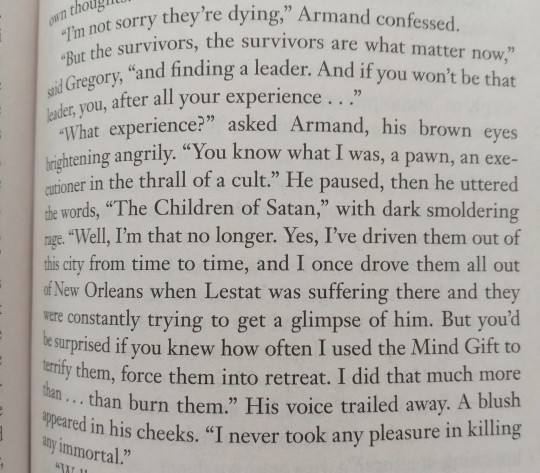
💙: Which character is not as hot as everyone else seems to think they are?
i was going to say Marius but I figure that's too obvious since everyone at this point knows I don't like Marius 😭 so here's an even hotter take,,,,, Lestat ‼️
Only to a degree, I think Lestat is hot and deserves the hype, but i also think he's hot in a different way then a chunk of the fandom does. Based on his book description he's kind of wonky looking, mouth too big for his face, vaguely unnerving shallow pale skin, starved 1700s peasant build but also kind of buff in the unhealthy "i dont eat regularly but I'm strong enough to carry a wolf for miles on my back" sense, weirdly small fucking feet. He def has creepy ass florescent blue doll eyes too. my point is I think when drooling over Lestat the fandom tends to forget this wonkiness in favor of blonde bombshell, Sam Reid chizzled jawline and abs, or conventionally beautiful anime twink, when they should be appreciating lestat in all his weird as shit glory.
#Ask game#tvc#the vampire chronicles#vampire chronicles#vc#armand#lestat de lioncourt#iwtv#interview with the vampire#the vampire armand#Prince Lestat#the vampire lestat#louis de pointe du lac
28 notes
·
View notes
Note
AWWHH tysm for the compliments <3 really made me smile!! Speaking of your Danny Phantom AU, I have another question about it!: Do Sam and Tucker like. Know that Danny's half-ghost? This question spawns from the little comic you made a few days ago and I noticed that they didn't... seem to know? If they do indeed not know, will they ever find out?- Jevil Anon
ah i see how that'd be confusing! that was a "nobody knows AU" (which was probs easy to miss me saying that with all that text i added to the post).
basically, it's a fandom-known au where, well, as its says on the tin: nobody knows Danny's the phantom. the reason i drew that AU was because I'm doing DannyMay, a phandom event where throughout all of May, we follow a list of themed prompts for the full month.
my AU is more so my "take" on the show's story, blending fanon and canon. aspects of my take have some fanon headcanons (some are my own, but most are common fanon):
(read more cause its long)
Danny kept his freckles growing up
said freckles glow in ghost form (which look like stars! Danny loves astronomy so its a fun character detail)
blue Phantom (to match how Vlad and Dan are blue)
^ mine's reasoning is that Danny's form/powers are based on being photographed by Sam at his time of death
Danny has lichtenberg scars (from being electrocuted)
having electric powers (though mine is actually light based powers that has electricity as an off shoot)
^ powers are more limited in general, just standard ghost abilities and the above
trans and Latino Danny
the full cast is some form of LGBTQA+
Jazz takes after her father, being more bulky. (cause no way both kids would be scrawny!)
tucker is a twitch streamer. his popularity stagnates/shrinks once he becomes busy with ghost hunting
Team Phantom has a TikTok
the portal is sentient, their name is Liminal Gates
the ghost portal was funded by Vlad (who has a different relationship with the Fentons than in canon) and has it hushed up by Nondisclosure Agreements.
Slow burn Vlad is evil reveal
season 3 didn't happen LMAO
Sam uses she/them and Clockwork use they/them
Dani (with an I) is called Ellie (this is for accessibility reasons like screen readers as well for general less confusion)
Ellie is not a clone but rather an alternative timeline Danny with a drastically different life. (because I think cloning is too morally horrific and illogical to write)
Slow burn Villain Ellie Masters (complete with a full story arc)
ghosts aren't aliens but rather traditional ghosts (for the most part, there's exceptions)
after a while, Danny's main objective is helping ghosts cross over to the after life.
ghost zone is a different spacial dimension (with a bunch of pseudo science takes from a high-school understanding of dimensions LOL)
pure ectoplasm is corrosive to flesh
halfas are time paradoxes, they're fusions of multiple timelines merged into one person
Fanon made characters: Wes Weston and his older brother, Kyle Weston. (extremely loosely based on background characters)
I think that's it for now! I'm sure five minutes from now I'll think of something and go "darn it!"
a lot of that is self indulgent or part of my "i'll work on this AU once in a while" attitude over the last few years -w- usually i'll check the DP tag once a month or so, but I'll have times (like rn) where I hyper-fixate on it. DannyMay really being a big reason I'm focusing so hard as well
21 notes
·
View notes
Note
(Slight spoilers for Elite Force below, but, like, the show genuinely ruins both shows so eh)
(Death tw)
Okay so it never actually happened in Elite Force because one of the characters supposedly kicked the bucket as far as we know which I will never not be mad about especially since Mighty Med still had an entire story line that needed to be completed that was completely brushed aside for EF and also the character I'm talking about was by far one of the best characters in the entire show and I'm getting offtopic but you feel my anger and pain.
(Death tw end)
Anyway, his name is Doctor Horace Diaz, he's the head of Mighty Med and is also the superhero Caduceo. He's a goofball and I love him.
Now, in Lab Rats, I am going to hope you know who Douglas Davenport is and skip the explanation of all of that. He's a chaotic mess and I love him.
A very long time ago I made a dumb post about "Hey, wouldn't it be funny if Horace and Douglas got together?" and created a shipname for them (Dorace). At the time I had yet to realize that jokingly shipping something always leads to actually shipping it, and, uh, I think me, blue, and cinnamonzor popularized it through random headcanons and a bunch of quotes submitted to the incorrect quotes blog.
Their entire dynamic is just "I would never say that my husband is a bitch and that I don't like him, I could never. My husband is a bitch!! And I love him VERY MUCH!!" and "I have very high standards and-" *guy 2 trips down a float of stairs and proceeds to burn his hand on the kitchen stove somehow* "I want that one" except you can't tell who is saying what because it works equally for both of them. They're adorable idiots, your honor.
They are both on opposite ends of the chaotic good spectrum, which means that dates usually end in either crimes or cuddles and sometimes both. They are also both incredibly smart so they have the ability to get away with a lot of the shit that they pull.
They also both have a bunch of kids so they are the Dad Duo™. They are pretty good parents most of the time and put Donald to more shame than he already has. They're just so amazing, your honor.
(Abuse tw)
Douglas is already incredibly queer coded in canon, too, is the thing. I'm, like, 99% sure that Giselle in Season 4 of Lab Rats was added just to straighten him out a bit, which, like Moira McTaggert to Charles Xavier, it didn't fucking work.
Anyway, throughout Season 3 of the show, while Douglas is still evil, he's working alongside this guy named Victor Krane, and WOO BOY ARE THESE TWO GAY.
They went as Brad and Angelina for Halloween, there are many cases of which Douglas talks to and about Krane as if they have been dating and depending on how you look at it even MARRIED, and they're just gay.
But also, like, on top of all of this, it has been outright said and implied many times that Krane tortured Douglas?? Which would be a fine little "ha ha deranged villain" joke for a show aimed at a bunch of 8-12 year olds if it wasn't for the fact that they have a HEAVILY QUEER CODED RELATIONSHIP. Douglas talks about how Krane regularly electrocuted him in one episode while Donald is messing with him and it's played off for laughs but just??? It's not funny.
Anyway what I'm trying to say is that this man also 100% has a bunch of issues that he needs to work through and probably projects these issues onto Horace in some way or another. He's just scared of a relationship in general, and actually being in one, as great as it is, is outright terrifying and he feels like he's walking on egg shells.
[Please note that I'm not trying to turn actual abuse into something that is purely explored to cause romantic relationship tension and that having trouble with it is crazy and makes the victim a bad person. I have explored these things in many other ways with this character, and recognize that, with real people, it is so much more varied than this. Felt like this should be specified.]
(Abuse tw end)
(Death tw again)
Now, back to Horace, I mentioned earlier that Horace is a goofball. And, like, I mean this way too literally. Again, I do understand that this is a show aimed at 8-12 year olds, but god damn sometimes it's just unsettling and straight up concerning.
Like, there's this one time in the show where everyone in Mighty Med is almost killed due to some mind control thing and then when they all snap out of it, the first thing Horace does is either start a conga line or start a game of limbo (I forget which one because the other happened at a different time).
Also, the way he treats his nephew isn't ideal, to put it lightly, but there are some moments where he proves that he genuinely does care about him. He also reiterates throughout the series that one of the reasons that he doesn't treat Alan (his newphew) is that he doesn't believe that he's enough of a father to him because he's not his real father. In the end it just kind of creates the effect that he's trying to distance himself from those closest to him.
The most important detail that I haven't mentioned yet is that he's immortal. Like, actually immortal. Really immortal. 3,006 years old immortal. He's had to live for such a long time, watching the people that he's grown close to continuously die, time and time again, while he's stuck jut not being able to die.
So, my point is that Horace is definitely not as sunshine-y as he seems and the way he acts on a regular basis could very well, at least partly, just be a coping mechanism of some sort. After living for so long, it makes sense that he has trouble being able to become close to people.
(Death tw end again)
Basically, there's a lot of angst potential with these two as well as fluff.
This got way longer than intended, so sorry about that.
(@blueskiesandstarrynights is actually the reason that more than half of the stuff in this ask is actually in the ask. If you scroll through the Dorace tag on here you'll find all our posts discussing these two.)
OMG I FORGOT ABOUT HORACE
Yes I totally support this
(also it's totally fine that this was long)
15 notes
·
View notes
Text
Mysterion characterization
In my opinion, he is one of the most mischaracterized people in the hero franchise.
He is often portrayed as an angsty, edgy, and a ruthless antihero.
Although I can see how that conclusion is come to, here are my thoughts:
*TL;DR at the bottom in red*
*This information is coming from both the game and show, if I can find direct clips, I will show them*
I used the word anti hero, allow me to elaborate on that briefly. For anyone unaware, an antihero is described as “a central character in a story, movie, or drama who lacks conventional heroic attributes.” I would also describe it as someone who is fighting for good while being uncaring/unhelpful to others if it means the majority of the public is helped. Note that the definition of what an antihero is varies from person to person. Poorly characterized antiheroes are written as villains who are part of the hero’s team for some unknown reason.
The first episode we see Mysterion in is in S13E2, he is seen as a rival to The Coon, however he does not view himself that way, in his eyes, he is helping because that’s what he should do, not to spite Cartman.
I think this episode is often forgotten when people view him as an anti hero. We see him expose his identity and putting himself in danger to not have citizens caught in The Coon’s attempt at blackmail. Not my exact idea of an antihero however I digress.
Spoilers for the the game
In the game, the entirety of freedom pals aren’t introduced until the halfway point, however Mysterion, Wonder Tweek, and Tuppaware are introduced very early as opposition. After a lovers quarrel between Tweek and Craig, Doctor Timothy have an argument causing the two factions to fight. Craig is a mandatory player on your team.
While you fight the Freedom Pals, Tweek is the one doing the most talking (I say Tweek because it is very out of character for Wonder Tweek). Throwing insult after insult at Craig, even when the insults aren’t at him directly, Craig respondes as though they were. Tuppaware is not to important, he does his job and fights you, nothing too noteworthy there. But this is about Mysterion so I’ll move on.
In this fight, nearly every time you attack him or his teammates, he responds with how we are only being used by The Coon and we can do better than the Coon and Friends franchise. Also, note that when the opposition show interest in attacking Wonder Tweek he appears fearful, Tuppaware looks disgusted, but Mysterion appears surprised? Disappointed? I’m not quite sure but it’s definitely different than the rest of the Freedom Pals’s reaction. (I know how pointless it may seem to analyze the facial expression when they’re drawn, well, like that. But also consider this! I don’t care.) The best way I could describe it is as being upset/disappointed that that he is being attacked. It is my belief that this is because he doesn’t want to fight. This is countered by the fact that he is a relentless fighter. The only time he isn’t is stated before: the first time you fight him.
The second time however is a different story, he attacks you ruthlessly. He gives you one chance at the beginning of the of the fight, saying that “Fighting Doctor Timothy is a mistake beyond your comprehension.” But afterwards makes no attempts to help you, instead changing to his one liners.
This is another thing I need to talk about. I have a post made for the future where I talk about way too many of his quotes but I’ll summarize it for you.
Being angsty
Being ruthlessly
Being dark
Being concerned for his teammates
Cheering his teammates on
There are some more types but these are the most important because a lot of his lines are dark, angsty, and ruthless and tend to overshadow his other quotes. The appeal to throw in the towel and say that he’s an antihero would be very easy but I truly don’t see it. Despite his quotes he isn’t as angsty in most parts and is seen being distressed for other teammates and trying to help whoever he can.
I believe that he says his quotes only to scare the opposition. When he interacts with his teammates and civilians he stops the angsty-ness and acts as a protector. In my opinion, an antihero would not care about their perception, if the job gets done that’s all that matters. But clearly Mysterion doesn’t abide by those rules.
Although alignment charts are a gross oversimplification for explaining characterization but I think it is a very simple way to explain it. On the character sheets, the alignment is more simplified and only allows lawful, neutral or evil. He describes himself as lawful but that is not a proper alignment. I am still torn on his alignment but I will show three alignments definitions then my thoughts.
Definitions
Lawful Good
A lawful good character acts as a good person is expected or required to act. They combine a commitment to oppose evil with the discipline to fight relentlessly. They tell the truth, keep their word, helps those in need, and speaks out against injustice. A lawful good character hates to see the guilty go unpunished.
Lawful good is the best alignment you can be because it combines honor and compassion.
Lawful good can be a dangerous alignment when it restricts freedom and criminalizes self-interest.
Lawful Neutral
A lawful neutral character acts as law, tradition, or a personal code directs them. Order and organization are paramount to them. They may believe in personal order and live by a code or standard, or they may believe in order for all and favor a strong, organized government.
Lawful neutral is the best alignment you can be because it means you are reliable and honorable without being a zealot.
Lawful neutral can be a dangerous alignment when it seeks to eliminate all freedom, choice, and diversity in society.
Neutral Good
A neutral good character does the best that a good person can do. They are devoted to helping others. They work with kings and magistrates but do not feel beholden to them.
Neutral good is the best alignment you can be because it means doing what is good without bias for or against order.
Neutral good can be a dangerous alignment when it advances mediocrity by limiting the actions of the truly capable.
*I did not add lawful evil because it is so wildly out of character there is no point in talking about it.*
Breaking it down
Lawful Good
A lawful good character acts as a good person is expected or required to act.
Mysterion shows himself to be a good person without wanting payment many times. Most notably when he reveals his identity to prevent harm to other citizens, and when he shows kindness and hope to the player despite the character and their teammates showing none back.
They combine a commitment to oppose evil with the discipline to fight relentlessly.
The commitment to fight evil seems self explanatory so I will not acknowledge that, what I will elaborate on is the “discipline to fight relentlessly”. Earlier in the post, I explain how he seems to not want to fight but does so fiercely. This explains it. He is the calmest out of the heroes at nearly all times, the only time this is false is when a teammate is unjustly injured. While he does get angry, he is never seen actively trying to start a fight, but he will always end one.
They tell the truth, keep their word, helps those in need, and speaks out against injustice.
Throughout the series and the game, he never lies, however, he is never asked to tell the truth and I’m hesitant on saying that the lack of evidence is evidence. Despite that he does keep his word, his promise to protect his city, and promise to protect Karen are always fulfilled. When the Coon acts against the group, Mysterion is quick to shut him down.
A lawful good character hates to see the guilty go unpunished.
In the game, he tells us multiple times that being a hero is ugly. That the merciless don’t deserve mercy. He has made it clear that he is the bringer of karma.
Lawful Neutral
A lawful neutral character acts as law, tradition, or a personal code directs them.
Mysterion is an upholder of morals. His own ethics pave how he reacts and behaves. For the most part, he follows the law very closely, but he will break off and actions will become unforgiving if the person deserves it.
Order and organization are paramount to them. They may believe in personal order and live by a code or standard…
His origin as Mysterion was to organize the town through peace and to help stop crime. He tries to keep his team peaceful and succeeds when part of freedom pals. When the franchise was whole, the Coon could break his peaceful exterior.
or they may believe in order for all and favor a strong, organized government.
This is the most difficult to defend. Yes, he does feed information to the police, but only when they are passive crimes. When active crimes occur, he attempts to deal with the issue himself.
Neutral Good
This is not in line with his personal alignment identity, but this seems the most plausible. Allow me to elaborate:
A neutral good character does the best that a good person can do.
This has been explained in many places throughout this post and so I do not feel the need to repeat it.
They are devoted to helping others.
Once again, Mysterion is constantly seen putting others first: revealing his identity, handling Hindsight by himself, and risking his life and immortality to save them from Cthulhu.
They work with kings and magistrates but do not feel beholden to them.
This feels more natural than the last explanation for lawful neutral. He works with the cops in certain situations but is quick to work by himself or with his teammates if needed.
The alignments have been broken down and the evidence has been laid out, feel free to make your own decision.
TL;DR
Mysterion is not a dark antihero, he is a vigilante, a defender of peace, and beacon of hope to his citizens. He puts the needs and safety of others before himself.
Alignment possibilities: lawful good, lawful neutral, neutral good.
44 notes
·
View notes
Text
You know, we’ve been continuing the conversations lately about the group’s inability to practice what they preach, what with Yang’s Raven secret and Ruby’s decision to perpetuate Ozpin’s decisions, but at least those two things are... acknowledged? Sort of. What I mean is, the story clearly thinks the Raven issue isn’t relevant. It absolutely is, but after three whole volumes and a dropped end credits scene, I think it’s pretty clear that RWBY considers it unimportant and has shuffled it off screen. Not worth your time, folks, and that in and of itself is some kind of acknowledgement: you should just let it go. Meanwhile, Ruby’s choices are frustratingly excused with a, “You’re different” speech, but at least an explanation exists, no matter how absurd. A dislike of the explanation doesn’t erase the fact that we got one. It’s still hypocritical, still stupid, still built on rewriting the themes as we go, but at least it’s something.
You know what hasn’t been dropped from the story and likewise hasn’t been given at least a shoddy excuse? Oscar’s secrets.
He (along with the rest of the group) lied to Ironwood for weeks/months about Salem and Ozpin
Then he kept the fact that Ironwood had gone off the deep end and tried to murder him quiet
Then Ozpin returned and he announced that he wouldn’t be sharing this crucial piece of info until he felt like it
Then he tops things off by, apparently, learning at some point that he had an insanely powerful weapon at his disposal and just... never brought that up
I don’t like dragging the farm boy because I love the farm boy, I spent a huge amount of time throughout Volumes 5 and 6 defending him, but he’s suffering big time from the writing flaws lately. Ruby (rightfully) gets most of the heat for lies and secrets because she’s the leader, the show’s main protagonist, and the one who actually speaks them to Ironwood, but Oscar is in his own unique trouble due to being Ozpin’s “better.” At least supposedly. I mean, I personally despise RWBY’s message that the younger generation is inherently superior to the last - “We don’t need adults” and all that - but I don’t think we can deny that such a message exists. Ozpin had his successes off screen, that extraordinary time of peace, yet when the show starts he’s in the process of a downfall. The school is taken over, he’s murdered, and two volumes later he’s literally on his knees, having what little control he retained snatched away. Who replaces him? Oscar. The young, hopeful, bright-eyed child who is now - literally, due to the merge - stepping into Ozpin’s shoes. He’s accepted by the team when Ozpin is not (even if it took way too long). He’s got the wealth of optimism when Ozpin falters. This last volume we saw him straight up go, “No, we’re not doing your escape plan, we’re doing my turn-the-villain plan.” Oscar exists to provide that contrast, the new and improved Ozpin 2.0. The story is essentially saying that Ozpin, the ancient planner, failed spectacularly, but Oscar, the young go-getter, succeeds. Oscar-as-Ozpin will do what Ozpin 1.0 failed to accomplish: helping to defeat Salem by the end of the series.
... so why is Oscar keeping so many secrets?
That’s the snag for me. That’s where RWBY’s intended message falls apart. Not because the message was never there in the first place, but because they’re writing it badly. Ozpin’s way of doing things is, according to the show, defined primarily by controlling information. Keeping things close to his chest, as he says in Volume 6. For Oscar to exist as his better, he needs to reject the actions that - again, the story says - are dangerous, hurtful, and bound to fail. We see that a little bit in his willingness to trust Hazel (which, imo, is far too much of an extreme in the opposite direction), but beyond that Oscar is acting exactly like Ozpin. He’s keeping that info close to his chest just in case Ironwood proves to be an enemy. He’s reducing a traumatic event to “a long story” so as not to upset his teammate and cause further distress in an already stressful situation. He’s deciding that there’s a time and a place for revealing Ozpin’s return and that he will wait until such a time works for him. He, apparently, has a wealth of knowledge at his disposal now, from weapons to information about the Relics, that he’s doling out only when he feels the group absolutely needs to know these things. The cane nuke is just the new moment on the train: we need to escape Salem so I’ll reveal that I have the power to do so; we need to avoid the grimm so I’ll reveal that the Relic attracts them. You get this information when I consider it relevant, not before. And as far as we know, the merge isn’t really happening yet. Oscar is no less Oscar than he was at the start of Volume 4, minus a tendency to stand straighter. That’s the lack of acknowledgement. The story isn’t saying that Oscar is getting cagey because evil Ozpin is infecting his soul, it’s positing this as normal development for him as an induvial and... ignoring the problem with that.
It’s real easy to point to Ruby as the main culprit here and critics (myself included) are absolutely right to. You really can’t do any worse than a whole volume of denouncing secrets, having Ruby parrot Ozpin’s near exact lies, and then try to hand-wave that away with, “But you’re different, Ruby.” RWBY’s moral themes shattered in that moment, but I think, beyond that hugely glaring flaw, there’s something a little subtler going on with Oscar - yet no less frustrating. The story clearly wants us to believe that Oscar is an improvement over Headmaster Ozpin, the new man (boy) who actually puts his trust in others... but who is he putting that trust in? Like the fandom’s worries that the group will eviscerate Jaune (the friend) after insta-forgiving Emerald (the enemy), it doesn’t sit right with me that Oscar is out here keeping major info from his teammates while handing out war intel to the guy torturing him in Salem’s whale. RWBY’s got its ideas of trust and forgiveness backwards and the crew doesn’t appear to realize that any excuses or explanations we might apply to Oscar will always apply to Ozpin too. Like Ruby and Ozpin, there remains a double standard at play between Oscar and Ozpin. You just can’t have this kid keeping so many things to himself now and ignore that this is the exact thing the story said was what made Ozpin the bad guy. Either acknowledge that and fix Oscar’s behavior, or acknowledge that and have the characters realize that Ozpin was right. Because without considering these choices, Oscar doesn’t actually exist as the contrast that I think RT wants him to be and the few nods to their differences - like trusting Hazel - come across as stupid decisions, not improvements. Rather than writing a kid from the next generation who is truly able to do better than the man who came before him, RWBY is writing a kid who is becoming exactly like his elder, with the exception of some incredibly foolish mistakes... all while claiming that he’s different in the way Ruby is different: just because, I guess.
42 notes
·
View notes
Text
Significance of “Madness” in anime
We’ve already established in other posts about significant emotions and concepts in anime or specific media before. The Significance of losing or the one of visuals and metaphors in Haikyuu!! are some of those I would love to mention here, but today we shall delve into a broader topic that goes more along the lines of Makii’s thrilling post about Danganronpa and the Significance of Despair.
Today, our topic of interest is madness.
To ease your mind, in this post we will be talking about the representation of insanity and madness in some anime characters and how that reflects on the story and ourselves as an audience.To make one thing clear, a lot of the times we see overexaggerated versions of unstable characteristics in anime that aren’t realistic.
This is in no way a discussion about actual mental illnesses and not a professional approach to analysing them to our real life standards, but maybe a start to an interesting discussion about how we portray and handle what one may colloquially call “craziness”.
Now that we’ve got that out of the way, let’s start!
Artists, and no matter for example if they write or draw, use their platforms to deliver messages in cryptic ways. As humans, we have the innate ability to look at something and consume the facts through entertainment which makes us crave new media to follow and analyse.
We love to question things instead of just taking them as they are, and that is why most writers out there will play around with the perception of their audience.
You may be familiar with the common question that ghosts through your head as you enjoy the latest episode of your favorite anime.
Why did he do that? Is she a traitor? What makes them think that way?
Although one might always do it consciously, we most definitely analyse whatever media we consume and decide for ourselves if it is important enough to keep in mind for future reference.
What the writer or founder of the anime ultimately wants from the reader is a reaction.
No matter what they intend to do with it, if they enjoy the viewer getting excited or traumatised is not of importance, but a reaction is evidently one of the goals.
And as strong emotions always evoke an even stronger reaction, anime characters are often very idealized and have ideologies that make them want to do one particular thing.
Be it save the world or destroy it, we focus and look at these characters and root for them if they give us a reason to do so.
Both sides of good and bad can have deeply rooted admiration drawn out of us, and it sometimes doesn’t even matter because the more interesting part is the lovely grey area in between.
We need a balance of good and bad to enjoy both.
Empathy makes us viewers want to relate to the characters, and if the author gives us the possibility to learn why someone does something, it gets harder and harder to dislike them. That’s why tragic backstories and flashbacks are such an overused tool in anime, because with the extreme behaviour some characters show they also need equal amounts of redemption.
We attach ourselves emotionally to characters depending on our personal tastes as well.
If someone likes and relates to a strong and independent protagonist who would drop anything for the sake of justice, you will find a lot of resembling characters in shounen for example.
On the other hand, if a darker or more obsessive character manages to take over a special place in a viewer’s heart, putting them on a pedestal gets more and more interesting, because you’re not supposed to.
Contrary to that, characters with insane or dark personality traits are often very popular, again tracing this back to human instinct of emphasising with wronged characters and curiously inspecting the fully deranged ones.
As this isn't something that should be put into vague concepts, we’re instead going to look at examples of characters and entities that are seen as ‘mad’ and how they’re interpreted.
It’s not just about villains being unreasonably immoral in this post, as we look into what madness entails and how it's shown, we also have some examples of corruption to look at.
So of course there are the typical evil-thinking evil-doing villains out there.
Some of them have an actual backstory to make them more realistic and believable, some others are just pure evil. While they are often called mad for their actions to achieve their goal, the reason why they are put into that light is the stark contrast between the protagonist and the villain.
If the protagonist loves to save people and always has a smile on his face, of course he will differ from his counterpart when he finds out that his methods are a bit more vicious.
The protagonist perceives the villain as insane most of the time, but what does the viewer think?
We seek to look not only at characters that are enjoyable to watch, but also try to find similarities between us and them or draw lines in their behavior to understand them better. As mentioned before, empathy plays a huge role here as well, since whatever happens in anime doesn't have actual repercussions, we can forgive characters more easily.
For example when they are taken by Insanity as a side effect rather than being insane due to trauma, we often get an 'ally turned traitor' trope through hypnosis or brainwashing, which is just as interesting to look at.
If a person did something horrible under the influence of something they had no control over, are they still to blame?
Does Insanity only involve a separate entity that comes from evil, or are we also looking at the gradual descent into darkness when life just isn't the same anymore?
Insane and with no fear: Soul Eater

A great example of how insanity plays with characters be they good or bad is Soul Eater.
With a premise that one needs a sound mind and body to inhibit a sound soul, we obviously know that people close to becoming Kishin-eggs will have a rotten soul drenched in bad deeds, but what about the good guys?
In this instance we have a lot of different types of madness and insanity that touches multiple characters at different times, and by far the most drastic would be the black blood.
The black blood being a synthesized weapon form of blood that can change form and harden into shape, is a weapon made by Medusa and introduced for the first time with Crona. He was melded together with Ragnarök as a weapon and used the black blood in his proficient fighting style.
Soul Eater as well as Maka and other characters later come into contact with the black blood, and the consequence of the immense strength that comes with it is debilitating madness.
As explained in the anime, the madness makes one deny the soul of oneself and others and takes away your fear. Now with no fear present, the person exhibits extremely erratic behavior and is not scared to hurt others or themselves.
This is an insanity that shows how essential a person's fear is, shown by Maka in one of the latest episodes when she fights Asura. The fact that she learned how to accept her own fear and realise that humans need it to survive is why insanity in Soul Eater is merely a concept to differentiate between what is human and what is Kishin.
A Kishin kills and murders with no fear of anything.
A human protects and masters one's own fear.
The power hungry insanity: Hunter x Hunter
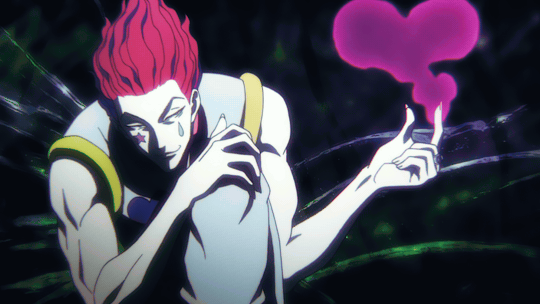
In Hunter x Hunter we have a lot of characters that don't exactly fit the norm of human action.
With people like Chrollo, Illumi and even Chimera Ants there is enough crazy to go around.
Still, the character we shall delve into to look at a different kind of instability is none other than Hisoka Morow.
Yes, in comparison to black blood madness Hisoka is an actual human being with no known influence outside of his own intellect. The contrary to another weapon or entity making someone insane is being shown in this anime.
Hisoka is just insane.
We have no means to see if there is anything that might have caused Hisoka to be the way that he is, but what we do know is that his character is almost too nonchalant for his own good.
His goal is to accumulate power and fight others that he seems worthy, as that is what attracts him. No person is spared if he believes he found a worthy opponent he will make that clear to them and pursue them passionately.
We could rule that the clown is just eccentric, but with the given information from the anime he definitely had some sort of mental difference next to his peers. Harming himself holds no problem to him, and his behavior is deeply rooted only to suit himself. He has no self-preservation except for when he needs to accomplish something, and he even enters the spiders just to get close to Chrollo.
Now we see a single person carry themselves throughout a story only to achieve one thing: a good fight.
After having looked at these two examples of insanity in anime, let's look at how that insanity can be portrayed visually.
A famous way to show someone's psychosis is the “Kubrick stare”. A directorial technique that got named after the director Stanley Kubrick who used a forward tilt of the head with eyes locked onto the camera to show the actors of his movies at their peak of madness. It became a very popular stylistic device and is used still very often in modern movies.
The character is supposed to look menacing, evil-plotting and absolutely unhinged.
Such devices, if used often enough, automatically invoke the message to the viewer.
If you’ve seen the Kubrick stare once in a psychotic character, you will definitely associate it with the same derangement again.
In anime we have a similar thing, and you might be aware of this already.
Familiar with the ‘eye angle just before a character goes insane’ meme?
It’s a running gag that shows multiple characters such as Asura from Soul Eater, Pain from Naruto, Light from Deathnote and Jason from Tokyo Ghoul in a frame where you can only see their eyes and it somehow looks extremely grotesque as if they were looking into different directions with their eyes.
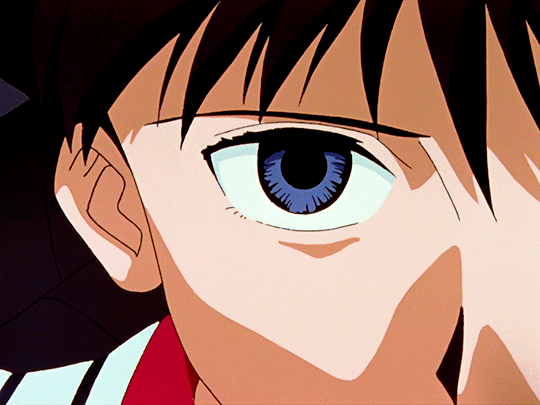
As much as it is a joke, it is a perfect example of something extremely similar to the Kubrick stare used in anime culture. It goes so far that if any anime watcher would see a new character look like in a frame, one would assume they were about to go crazy.
Even Oikawa Tooru from Haikyuu!! was shown with a Kubrick stare in the last moments of the second Seijoh vs. Karasuno game, when his desire to win overtook him with incredible force.
Without loss there naturally can’t be any wins, and without sadness there will be no joy in laughter.
We need the different depictions of what one might call madness, to fill our stories with nuance that relies on our reality.
Be it an unknown entity, hunger for power, lack of fear or the good old fashioned thrive for world domination.
Madness is just another part of what we call life, and to be honest in healthy doses and for effect why not enjoy it in anime?
Now, do you guys know any other characters or concepts in anime that would be worth mentioning? I would love to see them in the comments!
Until then, stay sane!
-Nissa
#nissakii#anime#manga#madness#insane#insanity#psychosis#mental illness#soul eater#maka#crona#medusa#asura#hxh#hunter x hunter#hisoka#chrollo#significance of madness in anime#crazy#kubrick stare
63 notes
·
View notes
Note
Keeping my fingers crossed for that Black Widow meta
Aha, okay. As usual, I am ludicrously easy to enable, so let's take a crack at this. The ask obviously contains SPOILERS for the Black Widow film (and is also tagged "black widow spoilers" if you're planning to filter), and discussion/reference to other films/properties in the MCU, though I don't feel like any of those are still a secret.
Anyway, as I said in my earlier post, I can't believe I am actually still trying to critically analyse a Marvel production in the year of our Lord 2021, but then, I feel like we all have a complicated relationship with it. Likewise, the feeling of "oh wow NOW you're giving Natasha a solo movie after you killed her off in a cheap and fairly sexist way in Endgame?" If this film had come out ten or even five years ago, it would have been major, but holding it off until now seems to have left most of us justifiably unimpressed. Plus, as I am absolutely not the first person to point out, it renders Natasha's sacrifice in Endgame "because I don't have a family" even more narratively incoherent. I realize that this film was written after that one by totally different people, there's no point in expecting the MCU to make consistent canonical sense throughout its eighty billion different films/series, we were all stuck with a mess after the Whedonified Age of Ultron Nat, and so forth, but still. Natasha explicitly SAYS that she has two families (her wacky Russian found family of spies and the Avengers) and her decision to leap off the cliff in Endgame to save Clint and his retconned perfect white heterosexual nuclear family.... Hmmmm. To which I say to you, I do not bite my thumb at you, sir, but I do bite my thumb at Male Writers, sir.
Likewise, while I am wildly attracted to Florence Pugh as Yelena and deeply desire to be wrapped between her thighs, the movie felt more like her story than Nat's. Yelena drove most of the plot and the action, while Nat was just kind of along for the ride. As a solo piece, we really didn't learn that much about Natasha aside from the opening scene (which felt like it was straight out of The Americans and probably worked the best of the whole film for the reason) with her childhood in America. But even the infamous "what happened in Budapest" backstory with her and Clint was quickly info-dumped rather than shown, and they could have taken more narrative risks or included more flashbacks or otherwise given us more NATASHA, y'know??? Instead of cramming the film into the small space between Civil War and Infinity War and making it even weirder that Nat seemingly has no memory or reference to these events when she returns to the team at that time. Why not show her looking for Yelena or her actual defection to the Avengers or anything else we might want from a film that purportedly exists entirely to provide backstory for a now-dead character? It felt like even in the film universe, the main quest was being repeated -- she tried to kill Baddie McSoviet once before and it didn't work out, so she has to do it again, something something. Okay.
As for that, good ol' Marvel and its American Superiority TM. The only actual Eastern European actress in this film about Eastern Europeans was Antonia/Taskmaster, played by the Ukrainian Olga Kurylenko (and I was very interested in her?? If she's supposed to be a narrative foil and a ghost of Nat's past and mark of her former sins, etc., why not develop her as an actual character?) Everyone else were Brits and Americans hamming it up with even more chew-the-scenery fake Russian accents than Elizabeth Olsen's "Sokovian" accent as Scarlet Witch. If it's established that they all have perfect American accents at the start of the movie, why is Nat the only American-accented character in the modern day if she had presumably the exact same childhood as Yelena? I know it's another way to set her apart, but that and Baddie McSoviet (the Russians are finding a way to steal free will from people's brains! Zomgz!!! Is this 2021 or 1981?) were straight out of the Cold War in terms of its not-so-veiled American Supremacy Message. Likewise, making modern!Natasha a former KGB agent never really made sense, since she says in Winter Soldier that she was born in 1984, and we see her in this film as an 11-year-old in 1995. But the USSR collapsed in 1991, when she was seven, and the Red Room appears to be an entirely unrelated flying....lab....thingy run by a generic evil Russian (Ray Winstone, likewise Hamming Up Accent). So like. What is she, guys?? Make up your minds!!!
Likewise, Baddie McSoviet/Dreykov as a villain obviously plays into the hoary old Hollywood "All Bad People Are Recognizable As Being Terrible Sexists and Also Probably Russians" trope, but aside from that, he doesn't make sense. He has this entire army of basically unstoppable Widows and he has just been.... waiting around and causing random explosions? Or was just waiting for Nat and company to return so he could Put His Evil Plan Into Motion? Are we really supposed to believe that this guy has just been sitting up in his flying saucer and essentially never doing anything this whole time? He had about a million chances to launch this take-over-the-world plan long before Natasha ever got there. Plus, I.... am.... not sure what to think (aside from /deep sigh/ MARVEL) about the fact that all the Widows we see dying/getting killed on screen are women of color. (Then the Black surgeon who was about to remove Yelena's brain in the Red Room and the only other Black guy being Natasha's errand boy, which just... in context... YIKES.) I think the fact that there are random Black background Widows are supposed to mean that they're inclusive and badass or something? Scarlett Johansson also has her own issues with White Feminism and all the other things we've critiqued her for before, so after TFATWS and the Flag Smashers, Marvel clearly has found its subtly racist sweet spot. As usual?
The end of the film also just basically turns into the standard Marvel empty-spectacle/cool-looking fights/people flying through the air thing, and I wanted a lot more focus on the wacky found-family Russian-spy hijinks (I did love them, for reasons) and character dynamics, rather than all of them separately fighting baddies in different places. I did obviously have feelings about Natasha putting the parachute on Yelena to save her life. But why were we then denied Nat/Gamora parallels/relationships/any character development or interaction at all in Infinity War/Endgame? Both of them are trained assassins adopted into a non-biological family that they have a complicated relationship with, but end up forging a strong bond with their sister (Yelena/Nebula) nonetheless. Of course, that would have required Endgame to put more effort into its female characters than what it did, which was one (1) Epic CGI Charge Scene at the very end, and literally nothing else. Not that I am still salty about this or anything.
Anyway. The movie was genuinely fun in places. The wacky Russian found family of spies was definitely the best part, even if it made Endgame even more nonsensical as a result. But I wanted this movie to be a lot better than it was overall, though I probably would have liked it more if it had actually come out in a timely fashion and wasn't only released after they killed her off. It just feels like there were so many possible threads of potential that could have been done with Natasha if they were actually interested in experimenting and exploring the character and not just coming up with new baddies and ways to go boom, and it unfortunately missed the mark with that.
31 notes
·
View notes
Text
I’ve been thinking about various aspects of SPoP, as I am wont to do, and as often happens, I’ve settled on trying to figure out why I feel a certain way. Namely regarding why I, personally, am able to feel so much more compassion towards Hordak rather than towards the Princesses. After all, the Princesses are the ones being wronged throughout this show, aren’t they? Their lands are being invaded. They’re the ones having to fight to maintain their way of life. They’re losing ground because of Hordak’s war.
So... why do I find it hard to care about them? Why are their experiences in this conflict just sort of... well, meaningless to me?
And why, instead, do my tender emotional responses strongly favor Hordak, despite his serious role in starting a terrible war?
Well! As per usual, I’m going to try to talk my way through it.
(and, as per usual, your mileage may vary!)
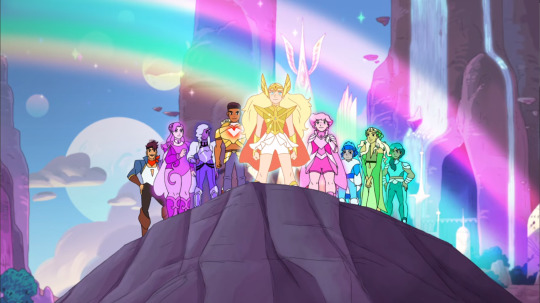
Let’s start with the Princesses. They range from children to young adults. Seem like reasonably nice girls, despite various flaws. They clearly did not ask for a war, had no hand in starting it, and are clearly on the side of good, seeking to protect innocents and simply return to a peaceful way of life.
They appear perfectly designed to garner sympathy and connection... yet I feel so little for them. I feel little because, despite the show telling me that they’re fighting for their lives, and for their home, despite them being the apparent underdogs in their battle against the Horde, I feel like their lives remain relatively stable. Pleasant. Even enjoyable.
Essentially, I feel like despite everything, they do not truly suffer. Not in a way that is consistent or touching.
The arcs the Princesses go through either deal largely with matters unrelated to the war and subsequently involve less arduous difficulties, or are handled in such a way that any real pain is quickly resolved and loses its impact.

Frosta and Perfuma represent the former. Both are parentless rulers of their kingdoms, but there is no real confirmation that their parents were killed by the Horde, and they themselves seem largely unperturbed by parental loss. They maintain control of their kingdoms throughout the series. Frosta never loses the Kingdom of Snows, while Perfuma, though in brief danger of losing Plumeria due to damage to the Heart Blossom, ends up... well, defeating the Horde with a band of untrained hippies. So while they fight in the war against Hordak, they never really suffer any significant, confirmed personal losses because of it.
In fact, the Plumerian conflict is... kind of played for laughs.


The other aspects of their arcs have largely to do with friendship matters, or self-belief, and are also dealt with quickly and with little fanfare. Frosta learns how to make friends. Perfuma learns how to play with cacti. Afterwards, Frosta spends the remainder of the story essentially being a violence-happy little kid; amusing, yes, but not particularly tugging at my heartstrings. Perfuma likewise settles into “sympathetic friend” and, though she’s involved in Scorpia’s story at the end, also does little to invoke any sort of significant emotion.
we’re just going to skirt around the whole “leashing Entrapta” thing, as it’s not relevant to this discussion
(Spinnerella and Netossa barely even register to me, given their very bare-bones roles in the first four seasons and standard “chipped loved one” narrative (that everyone experiences) in the fifth.)
So, let’s move on to Glimmer and Mermista.

Glimmer and Mermista are arguably the two Princesses who actually lose unique things in the war and suffer because of those losses. And yet, because of the way the show is written, even their pain is dulled in such a way that it just does not facilitate me forming any sort of consistent, compassionate bond with them.
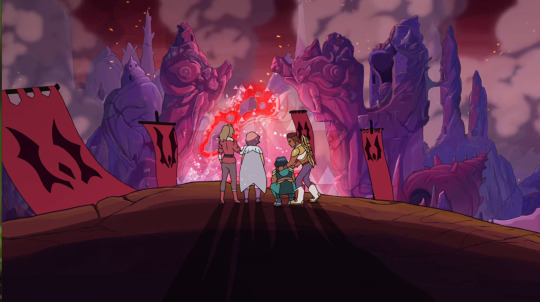
Mermista is the only Princess to actually lose a kingdom. In Hordak’s most visible evil act, Salineas is burned and beflagged, leading to Mermista deeply mourning the loss of her home, her culture, her peop- oh. Hm.

She takes it oddly well, doesn’t she? Apparently, ice cream in a bathtub is how deposed rulers deal with the loss of their entire country nowadays.
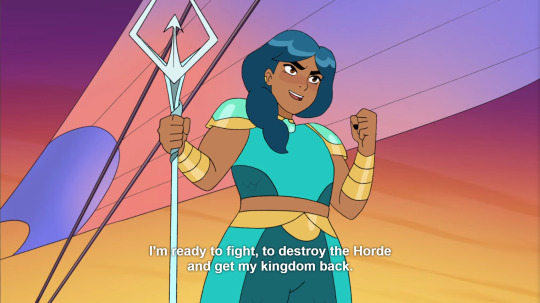
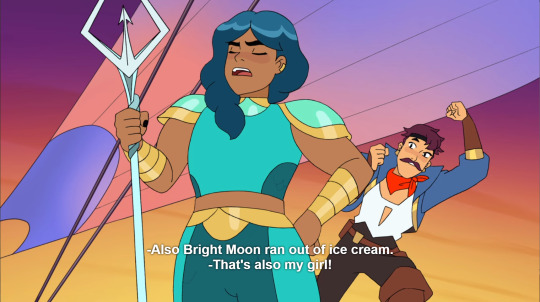
And once she’s done with her moment of moping, she’s back in the fight, fueled by Sea Hawk’s shenanigans and her own power ballad (and Bright Moon’s lack of ice cream). There is no extended mourning for her people, no real depth to the loss she has supposedly suffered. There’s not even a real sense of it: we never see the people of Salineas, never know them, never get to feel anything for them. And with them being all but theoretical, the show appears to have no issue quickly forgetting them: Mermista never negotiates on their behalf, or visits refugees, or... anything. She might use Salineas in her future battle cries and as an excuse for increased recklessness, but that homage is the extent of emotion that we see.
Kingdom gone, bathtub ice cream finished, she goes on living life as if little has happened. And, because of her royal connections, she doesn’t even experience a decrease in quality of life: she continues to live in luxurious comfort despite an apparently raging war.
Because of how the writing handles Salineas, and her character in general, I never feel connected to how Mermista feels. Whatever pain she experiences is there and gone in a few scenes, quickly dealt with so the story can continue. There is no exploration, no nuance, nothing to really make me appreciate any sort of depth to her experience. And so I feel little, if anything, for her plight.
Glimmer, then, is the last chance the show has to make me feel something for the Alliance Princesses’ suffering during this war, and while season four nearly does it, the series again ends up falling short.


Glimmer loses her mother. The actual sacrifice is emotional... though that emotion, admittedly, comes mainly from Adora. Glimmer’s pain comes through at the beginning of season four, when she is clearly in mourning all while needing to take Angella’s place as queen. Afterwards, season four does a fairly good job of making the loss meaningful: Glimmer becomes more and more willing to commit dark acts due to a mixture of grief and desperation. It works well, and out of all of the Princesses, I feel for her the most... until season five comes along and pretty much erases Angella from character consciousness.
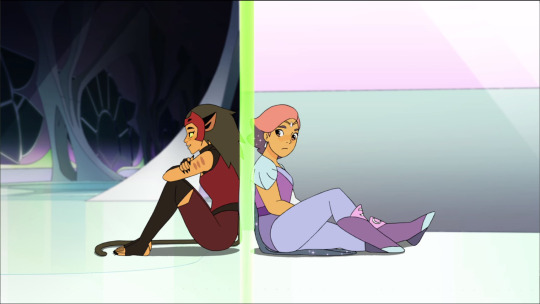
Angella’s death essentially plays no role in season five. Glimmer does not appear to think back to it. While it drives her actions during season four, it appears to have been all but forgotten now, a particularly glaring shift when Catra, the one who is practically responsible, joins the group without it coming up at all. Glimmer’s other parental loss, Micah, likewise becomes meaningless not because of questionable writing choices, but because he simply never died.
Glimmer’s other problem, her rift with Bow and Adora, is repaired within an episode and never spoken of again. That... falls quite flat for me.
And so, by the end of the series, Glimmer fails to maintain a believable level of distress and thus doesn’t invoke any real emotion in me. The one thing that really mattered, that really hurt her? Suddenly irrelevant in the name of Catra’s redemption. Hm.

And while these are the specific character examples that come to mind, the general situation the Princesses find themselves also fails to carry much weight in my mind. They are in the middle of a war, yet they continue to live in luxury. Skirmishes carry a sense of light-heartedness and sometimes seem almost fun. Battle plans are developed via a game of DnD. There is just no consistent sense of urgency or severity, no believable sense of emotional depth to convey to me that these characters are in truly dire straits. Yes, there are moments... but these moments are so brief, and carry such questionable lasting impact, that they don’t connect with me the way that they should. And as a result, the plight of the Princesses just feels hollow to me.
I just... I just find myself unable to care about them because, when all is said and done, I don’t feel like they are truly in danger of real harm, or that they are realistically affected by their losses. It all just feels so shallow to me.
Now, let’s pivot and look at Hordak. Hordak, whom I still cry over on the daily. Hordak, who has owned my heart for over a year now. Hordak, who invokes in me all of the emotions.
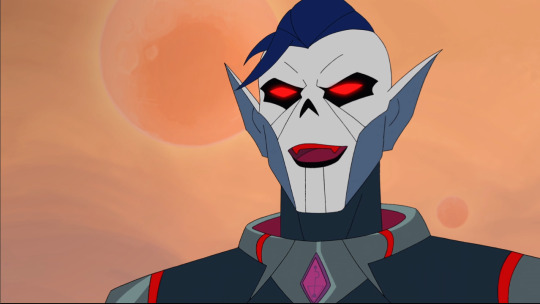
What is the difference between Hordak and the Princesses, other than the glaring fact that he is the instigator of the Etherian war and thus a bad, bad man? What makes him snap my heartstrings in half, while the Princesses barely manage a gentle tug?

The answer is that Hordak legitimately suffers. Terribly. Consistently. Throughout the entire series. While the Princesses experience brief moments of distress that the show quickly sweeps under the rug in favor of witty banter and friendship problems, Hordak is the direct opposite: he experiences only the occasional breath of happiness while otherwise drowning in a constant sea of bitterness, fear, pain, and deep unhappiness.
From the moment we meet him, Hordak is stern and humorless and angry, and while this initially appears to be a side effect of him being a Standard Ultimate Villain Who Never Smiles, we quickly learn that it is due to his struggle. Hordak is constantly struggling against his physical defect, battling an illness that causes him not only significant health problems, but incredible shame. He is likewise constantly struggling to earn the respect and validation and nonexistent love of his god-brother. His sour demeanor, with all of its anger and dourness, originates in the fact that, throughout the overwhelming majority of the series, he is gravely unhappy. He is in ever-present distress, both physical and emotional.

And as the series goes on, does that distress lessen? No. No, instead, he is rejected by his brother, thoroughly humiliated, and brutally “reset” back into his life as an actual cult slave. Rather than having his difficulties minimized like so many Princesses do, he finds himself in ever-worsening circumstances, graduating from (supposed) “disgraced, disabled military veteran” to “enslaved cultist desperate to be loved by his loveless master.”
Any moments of happiness are not only relatively brief, they are taken away as quickly as the Princesses’ moments of difficulty are. Hordak experiences love and friendship for the first time with Entrapta, only to swiftly lose her to Catra’s lies and spiraling madness. He finally begins to win the Etherian War (which is bad, yes, I know), only to realize that his victories stem from Catra’s betrayal before the whole affair culminates in Prime’s nauseating violation of his personhood.
It does not stop. Physically, mentally, or emotionally: not until his triumph over Prime in the season five finale does Hordak stop hurting, and even that is marred by Prime taking control of his body in a final act of nightmarish control before, bless him, Hordak is freed and able to begin his recovery.

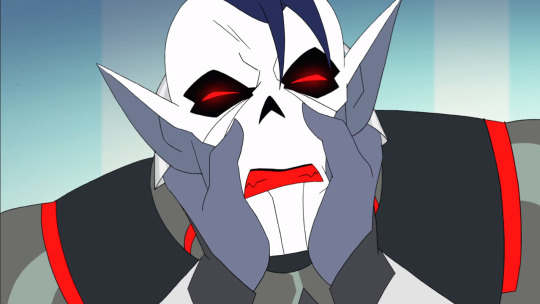
In addition to being a series constant, Hordak’s pain is conveyed. It is dramatically shown through facial expressions, through body language, through phenomenal voice work, through scenes that clearly depict real anguish.
The purification ritual is one of them; what other character do we hear scream like that, over and over, due to such terrible agony? His reunion with Prime is another; I will never forget how deeply I could sense his fear, how watching him tremble and beg instilled within me a sort of breathless panic because the scene actually made me want to instinctively protect him... but I could not because, y’know: cartoon.

Hordak’s suffering is not only ever-present, it is varied and developed and communicated to the viewer in ways that result in it making a lasting impression. It is never minimized. It is never ignored. It is painful and horrifying with little reprieve, and it has a deep, life-altering effect on him.
That, friends and neighbors, is why I think I find myself feeling so much more compassion towards Hordak than I do towards the Princesses, despite his less-enticing place on the moral spectrum. Hordak is in pain. Consistently, meaningfully. He suffers, and the story takes it with every ounce of seriousness it can muster.
The Princesses, on the other hand, either experience little hurt or, when they do suffer, do so briefly before the narrative shoves it aside in favor of Catradora other things. As a result, they fail to make the same impression. They fail to garner my compassion because, in the end, they just don’t seem to really need it.
Whereas Hordak does.
379 notes
·
View notes
Photo

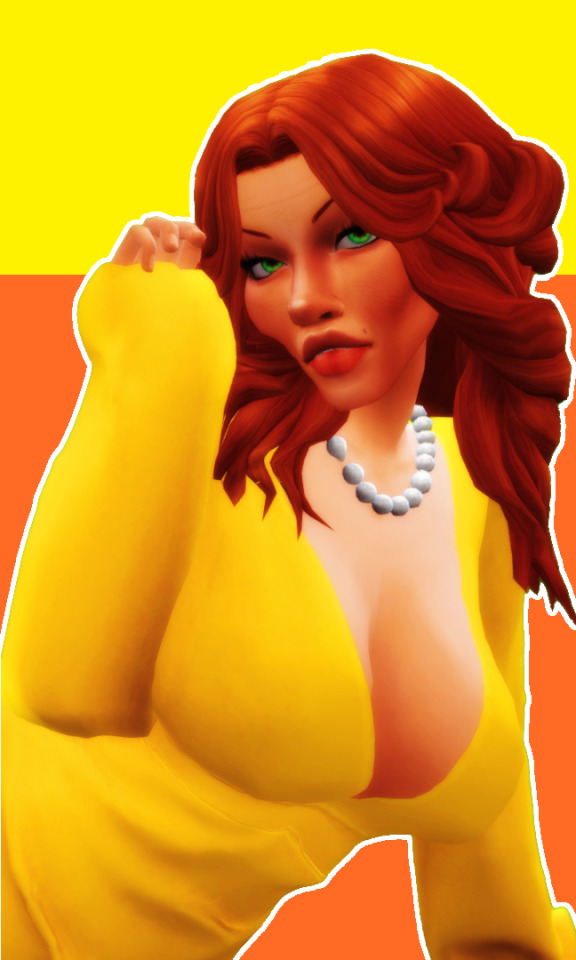
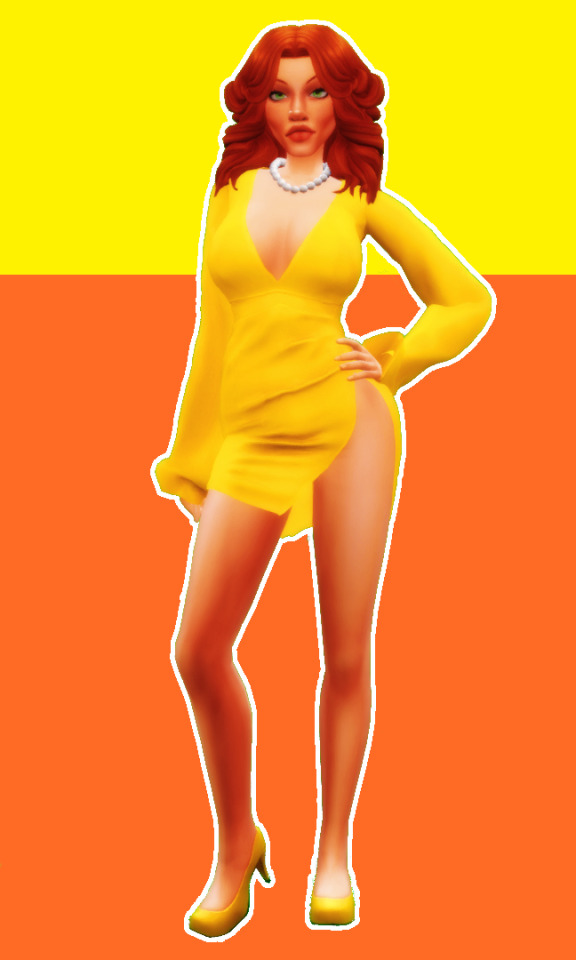
@softeberrie‘s sugar baby bachelorette challenge
name: priscilla mae cunningham age: 46 (adult) traits: materialistic - evil - dance machine gender and pronouns: pansexual cis woman (she/her) household funds: 500,000ish (i might’ve left in more by mistake but shh) occupation: supreme villain (lvl 10 of the secret agent career, villain branch) interests/hobbies: dancing, clubbing, partying, shopping, villainy, mischief, mixology, fitness (particularly hiking, biking, and rock climbing), sex what your sim is looking for in a sugar baby: a good fuck to spoil with lavish gifts, shopping sprees, and extravagant vacations; someone to keep her company in her obscenely large mansion in the country (or wherever life takes them); a companion to gossip with background story: from her to birth into her father’s doughnut empire to her years spent in the limelight as america’s sweetheart in her hit sitcom big house on the little corner, priscilla mae has been accustomed to a certain way of life--one that she’s willing to share.
full backstory under the cut because i accidentally wrote a fucking novel
ps jeejee i have her on sfs ready to go if you want her < 3
born into the world of beauty pageants and a misogynistic upper class society, priscilla mae’s mother had always been held to certain standards and expected the same in return from her daughter. a proud southern belle who had been tragically left a widow after a vending machine suddenly ended her poor husband’s young life shortly after the birth of their only child, she taught priscilla mae from a young age that to get anywhere in life you only needed two things: beauty and money. it was a lesson that priscilla mae carried with her throughout all her life as she competed in endless pageants; starred in her own television show; and settled down with san myshuno’s most legible bachelor, beau cunningham, upon turning eighteen and discovering her mother had squandered away the family fortune and whatever money priscilla mae had earned throughout her childhood.
beau was a fabulously wealthy, albeit much older, business man who was away more often than not but still found the time to have his secretary pick out expensive gifts to send to the new mrs. cunningham to keep up the appearance of being a loving husband. this was more than fine by priscilla mae, for the two had settled on an agreement: priscilla mae would gain unlimited access to beau’s bank accounts and in return he would gain unlimited access to her holes, as beau had so delicately phrased it. on occasion he’d stop by for a quick booty call before he had to catch his next flight. this resulted in the birth of their three children—jud, jackson, and june belle—and beau’s eventual vasectomy. priscilla mae was ecstatic to be a mother and spent most of her days tending to her children. during schools day, priscilla mae spent her time in designer stores, spas, and exclusive country clubs; on the weekends she found herself throwing parties for all her friends and family, attending charity events (sometimes with, but more often than not in place of her husband) which kept her in the spotlight despite retiring from acting, and club hopping after the children had been put to sleep; and each holiday she took the children to some far away five star resort to celebrate and shower them in more toys than they could possibly ever play with as a vain consolation for beau’s constant absence.
although gained under unfortunate circumstances, priscilla mae quite enjoyed her new life for many years. however, when her children inevitably grew into young adults and had all left home, she found herself with more free time than she knew what to do with. suddenly she grew tired of the same routine she had stuck with for more years than she could remember. priscilla mae decided it was time for a change and took her new free time to achieve a dream she had since she was just a little girl: becoming a super villain. she enrolled at foxbury, wanting only the finest education available. after graduating at the top of her class with a distinguished degree after only a few years, priscilla mae left san myshuno far behind and moved back to the countryside where she had spent her childhood. although she claimed it was because she had grown tired of the city’s incessant hustle and bustle and longed for peace, those close to her knew the truth: there’s nowhere to hide an underground secret lair in an apartment.
with her newfound “hobby” to break up the monotony of her old life, priscilla mae eagerly embarked on an exciting journey: causing complete and utter chaos for sims all over the globe. for a short while she was happy, content with wreaking havoc on innocent civilians during the day and partying at night, until one day the freedom priscilla mae had cherished for so long came to an abrupt end.
beau, now an even older man than before, suffered a heart attack while away in sulani on business. after spending some time in the hospital, he was flown out to the mansion where he could further rest. it was at this time priscilla mae really got to know the man she married so many years ago, and it was at this time that she grew to hate him as well.
every little thing that beau did grated on her nerves. she despised the way he talked, the sounds he made when he was chewing, how he expected her to light his cigars when he knew the smell makes her sick, his obnoxious friends he invited over at odd hours... but what she resented most of all was the way he expected her to dote on him hand and foot, to drop everything to tend to his every need without so much as a “please” or “thank you” in return. the nerve of it all, tearing her down right after she had just found a new meaning in life. priscilla mae wasn’t going to stand by idly as her dream got ripped to shreds before her very eyes.
no, she was going to have a plan. she was going to finish him in more ways than one.
a mere two weeks after beau’s release from the hospital, priscilla mae decided she was going to surprise him after an exhausting day with a little gift. upon following her to her lair, beau discovered priscilla mae had another secret room put into the mansion: a sex room. immediately after opening the door he was greeted by something he had only seen in adult films: in the very middle of the room was a brand new sex swing just waiting to be broken in. overcome with lust, he got onto it eagerly at priscilla mae’s request and then it began...
and then it completely ended.
poor priscilla mae... how was she supposed to know that her darling husband’s heart would give out during his orgasm?
after playing the part of the grieving wife for a few months to not cause suspicion, priscilla mae went back to her old life that she had missed so dearly. for a year or so she was content again until she started to find the silence in the mansion deafening. the only relief from it’s during the holidays when her children and grandchildren come to visit, but almost as quickly as it starts it ends and priscilla mae finds herself once again alone in large, quiet rooms. now she looks for a way to fill the silence in the form of a sugar baby--what better way is there for her to pay it forward?
#sorry it's so long dcjsgcfdsg#also good luck she's gonna be a handful i just have a feeling#my ocs: priscilla mae cunningham#my entries#ts4#sugarbabybachelorette#ask to tag#age gap cw#murder cw#violence cw#death cw
8 notes
·
View notes
Text
Here are some brief thoughts on kdrama that started airing in 2020 that I've watched. I said brief, but those who have been following me would appreciate that this is indeed, brief.
The list is in alphabetical order.
1. 365: Repeat the Year (MBC)
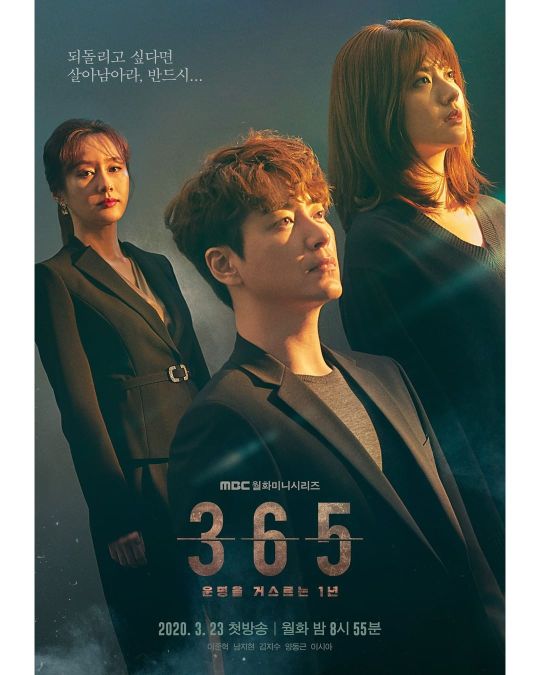
Disclosure: I am a HUGE Lee Joon Hyuk stan. He is second only to Hyun Bin on my list. The fact that this drama is on the top of this list is a happy coincidence 🥰🥰
I was soooooooo excited when I knew Lee Joon Hyuk was to star in a new drama. MBC made the announcement of the drama late last year, and I was literally walking to the office when I saw the announcement on ig.
The premise of the drama was pretty straightforward. 10 people were given the chance to travel back in time exactly one year prior. Mysterious things kept happening to the people who took the trip, so our Detective Ji “Fluffy-Hair” Hyung Joo and webtoon writer Shin “Self-Hater” Ga Hyun joined hands to figure out what exactly happened.
Once they finally figured out what caused the mysterious cases, they faced a great dilemma on what to do, with our Fluffy Hair detective running as a fugitive.
The ending was really sad, and I really wished it ended differently, but the main character of the story was our Fluffy Hair detective, and him having to live on and reset the whole thing from the new past was a nice touch to the ending.
This drama was full of surprises, twist and turn, and it is certainly a drama I would consider rewatching in the future.
2. Do You Like Brahms? (SBS)

Many people criticised the second half of this drama. Apparently the year 2020 is the year when kdramaland keeps being a disappointment, and many people are quick to include this drama in the list of disappointing drama, despite having a good beginning.
I beg to differ though. To me this drama feels more of a healing drama, wherein the characters are forced to deal with their issues. And anyone who has had to go through any form of therapy knows how hard healing process is.
TL;DR: The main leads are both people who have been mentally abused by the people around them, except for Cha Young In, because she was the only reason I did not throw my remote control at my 50-inch TV.
Park Joon Young is your classic example of a ‘gifted kid’ struggle. He was seen as a young, talented pianist who had a bright future ahead of him. But people started to treat him more like a trophy than a human being, so he decided to take a sabbatical, much to the criticism of people in the music industry. Park Joon Young realised that his passion in playing the piano has faded away, no thanks to his abusive piano professor who belittled him again and again, and practically brainwashed him into being a people pleaser. You could see how Park Joon Young was not himself in the beginning of the drama once you finish the drama.
Chae Song Ah took interest in violin at a later age (much later than professional musicians) and decided to pursue her dream by enrolling into a music programme. Her classmates were all younger than her, and it didn’t help that they all learnt music since much younger. I love how Song Ah did not give up on her dream easily and gave it her all, before she finally decided to let go of her dream to become a musician. The metaphor of her love for violin and Joon Young hurting her again and again and she just endured it though.. I cried like a mess well I am a mess but that’s a separate issue
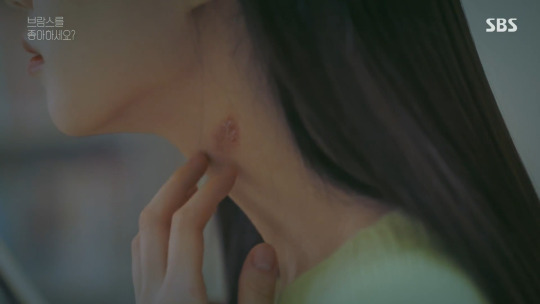
Special shout out to Cha Young In who was there for both of them.
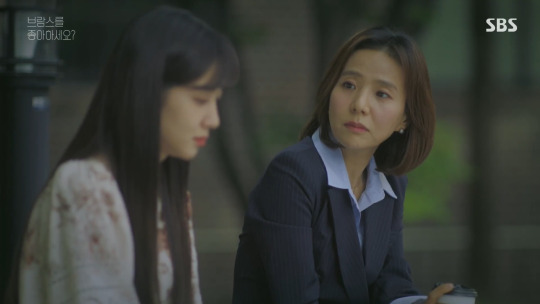
3. Flower of Evil (tvN)
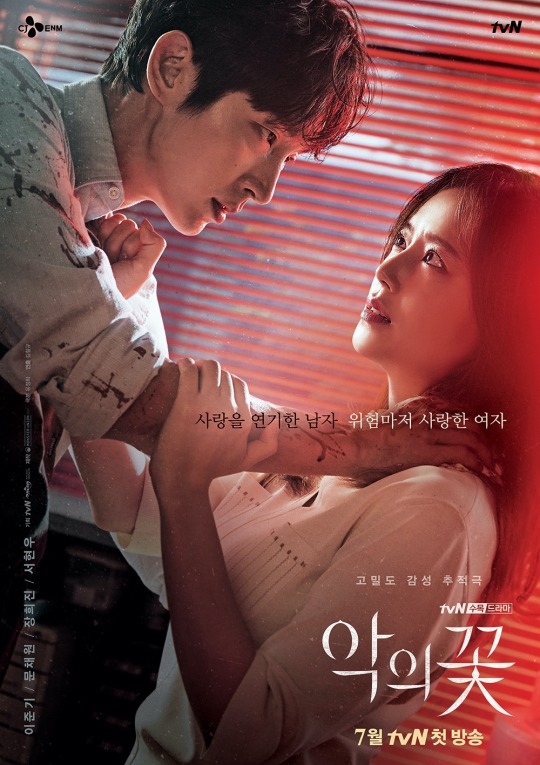
If thriller is your thing, consider this drama. If you are one of those people who like to see your characters being tortured (physically and mentally), this drama is a MUST WATCH. And if you enjoy watching Lee Joon Ki playing a character who is put at a great distress because he is trying to run from his past, go watch this drama.
More importantly, if you enjoy a drama where your ML is sexy, attends to house chores and takes care of his bright young daughter while his wife goes crazy for solving violent crimes, a devoted husband who is attentive and a tender person but also a freak in the sheets, you are wasting every single of your breath not watching this drama.
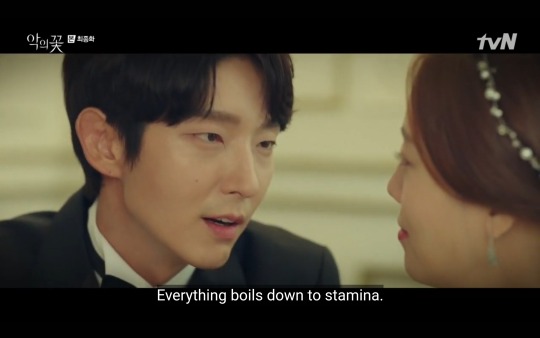
I mean look at this man teasing his wife about his stamina.
Flower of Evil did not feel draggy at all. Everything that happened within the first 6 episodes could have been an entire drama if this was written by someone else. Seriously, this drama kept me at the edge of my couch!
The dynamic of HS and JW screams POWER COUPLE but at the same time it broke my heart how they were pushed into corners too many times by the people around them I do hope they had some sexy times while they were in the corners though
The focus on their wedding rings throughout the drama symbolised their unbreakable bond. The wedding rings were literally the very last thing that kept them together when JW stumbled upon evidences that pointed against HS.
JW, whose compass was only trusting what she saw, and not what she heard, tried to break the stigma of women being at a disadvantage in the police force. Heck, she was better than her entire team when it came to solving cases, her being the only woman in the team. Who said women cannot make good cops?
The plot twist though.. And the climax.. To this day, I still listen to this soundtrack from the drama and cry just thinking of the climax.
4. Into the Ring (also known as Memorials) (KBS2)

I didn’t even plan on watching this drama. I was channel surfing and saw Park Sung Hoon looking all depressed in the first episode and ran into Koo Se Ra. Girl was UNHINGED and determined to fight for her way.
Her motivation was initially on getting a stable pay check from being a district representative (it was only 60 million won which is like USD55k so it’s not that much) but she eventually became the district representative who fought for the benefit of the people and did not care for the political warfare that took place.
Came along Seo Gong Myung, a government officer in the local government office who was demoted from planning unit of the accounting department or something to be a secretariat to the district assembly. Seo Gong Myung sticks to his principle no matter what, which surprise surprise, is HATED by everyone in the district government.
Turns out our main leads were friends when they were kids so Se Ra kept teasing him and dragging him into her scheme of fighting for the people, which Gong Myung agreed to, not so much because he was a community-loving person, but because he was afraid Se Ra would get into trouble since she was as straight as a ruler.
Long story short, our leads fell for each other, and their relationship was HILAIROUS to watch. I think I speak for everyone who watched the drama that we had no reason to believe Se Ra did not peg Gong Myung for fun 😝😝

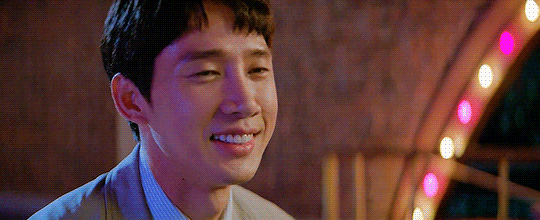
They were so cute together awwww
5. Kairos (MBC)
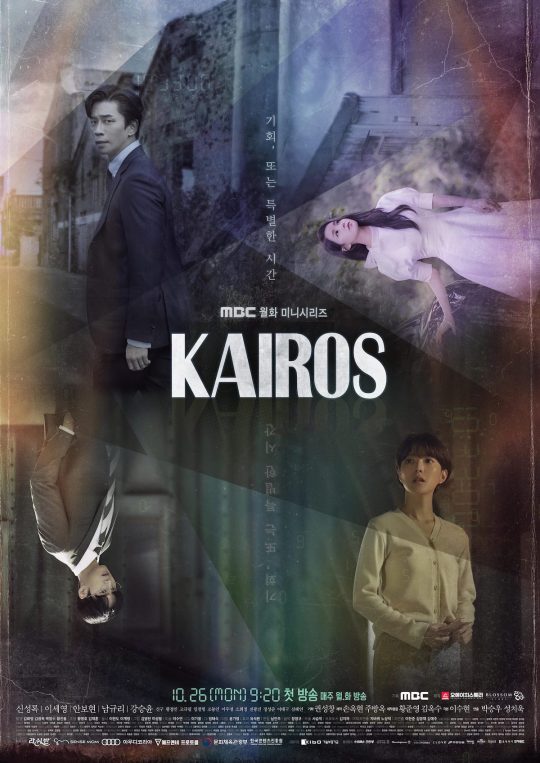
This is another drama that I stumbled into. Only this time, I saw Nam Gyu Ri and I remember seeing her ig post on a new drama so I decided to give it a go. She wrecked my heart in 49 Days so I decided to check this out for funsies. Hooo boy was I in for a major surprise.
The first two episodes got me hooketh!! I still cannot believe how the drama managed to keep me on my edge especially during the last 5 minutes of every episode. The pacing is even faster than Flower of Evil, and since this drama went back and forth between past and future, it keeps me guessing whether their efforts would bear fruit.
Will Kim “Sexy Brain” Seo Jin and Han “I-Know-No-Fear” Ae Ri succeed in fighting the evil, who at this point in time remains unknown? I know Chairman Yoo Seo Il is currently being hinted as the culprit behind everything but I know better that he is just a puppet who sold his soul to the real devil who most likely is in the higher ranks in politics. I mean he even hinted at his remorse for what happened with Taejung Town 19 years prior. My suspicion is he is trying to cover up whatever happened because otherwise his own family would be at risk, so his only option is to redeem himself by doing something about the Taejung Town. I could be wrong, but regardless of who turns out to be the real villain in the story, I can say I am so satisfied by how the story has progressed so far.
The time paradox still hurts my brain, but I am choosing that this drama does not assume that time is linear.
There is still not enough people watching this drama and I’m begging you all to go and catch up before it ends in two weeks time.
6. More than Friends (JTBC)
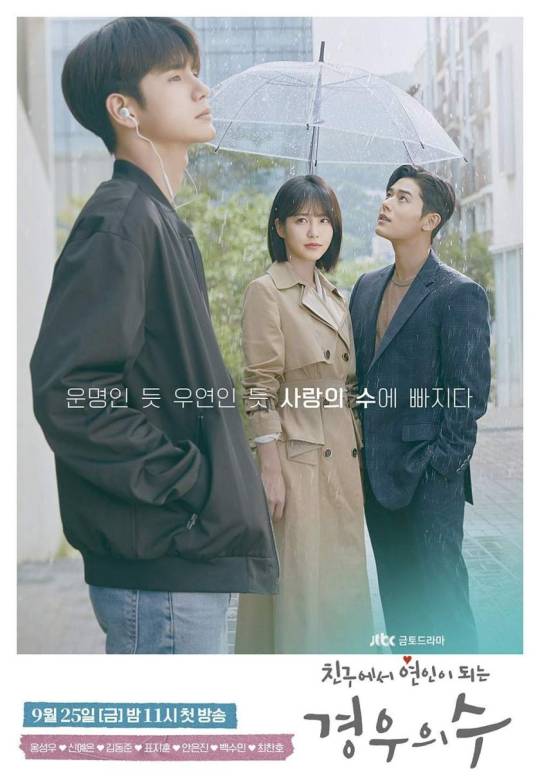
A little trivia: I reblog most of the posts from @kdramastuff even if I am not watching the show at the point of reblogging the posts. I had been following her posts on this drama for 3 weeks, and I finally decided to marathon all 6 episodes and joined the watching party.
More than Friends was another drama that many people called a disappointment but I had a different opinion on it. Yes, I used to be the nerd who had different opinions on many things in high school sue me
The drama is premised on Kyung Woo Yeon who is said to have a crush on her high school friend, Lee Soo for 10 years. Lee Soo is nowhere near to be the perfect boyfriend material. He is selfish, does not care about other people’s feelings, and was always a lone ranger.
BUUUUUUT, Lee Soo seemed to show signs of care and affection (even though it was not at all for a normal person’s standard) for Woo Yeon. Surprisingly, he seemed to only do it for Woo Yeon and gave attention to Woo Yeon alone, even though he could practically pick and choose anyone he liked from the swarm of girls who were chasing him.
One day, he told Woo Yeon that he had to leave to the US to study, which made our girl sad. She decided to confess at the airport, but he outright turned her down, saying he only wanted to be friends with her. Over the time, they kept running into each other by coincidence (note: her name Woo Yeon is a wordplay on coincidence in Korean). Later, it was revealed that he wanted her to always be by his side, but he has built a wall as tall as the Great Wall of China before the idea of love so he didn’t realise what his true feeling for Woo Yeon was all along.
Woo Yeon, who felt sick of the ten-year crush, decided to end the “curse” and kissed him by the beach, thinking of getting a closure on her crush.

Long story short, Lee Soo finally realised his feeling for her and decided to confess, but by that time, a young, handsome, rich CEO of a conglomerate has entered into the picture. Cue the game of cat and mouse between Lee Soo and Woo Yeon about resentment, regret and relationship.
This drama was promoted as a romcom, but it feels more like a slice-of-life drama with a mix of melo and romcom in there. Seriously, I cried buckets watching this drama, not something you’d expect from a romcom. The dialogues were well-written, with each episode revolving around a specific theme. This was such a good drama coming from a rookie writer.
This drama did not have that many viewers to begin with, and many of those few people dropped it along the way, including the one who was responsible in getting me hooked into this drama :p By the end of it, there were so few people talking about this drama in the tag (shout out to @dohyunsoo @have-yet-to-decide @starfire-s @thbn-anything for keeping me company to the very end of this drama)
This drama broke my record of screenshots per episode and total screenshots for any show. Until now, I have yet to finish posting them. I should probably upload more screenshots later tonight.
This drama had some AMAZING shots in the first half, with beautiful sceneries mostly in Seoul. It’s like what they said, “a daily occurrence for you, a trip for me”.



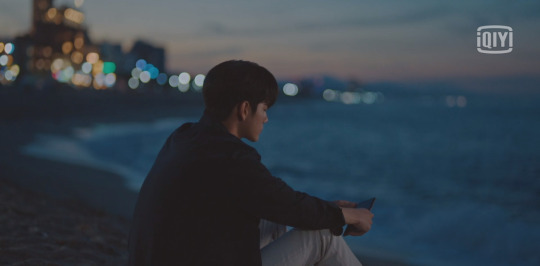


7. Oh My Baby (tvN)
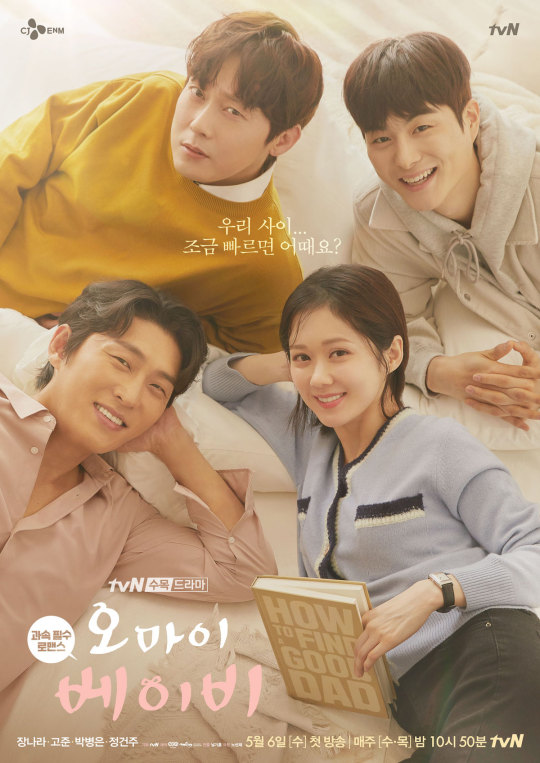
I did not even remember watching this drama!! It was only after scrolling through my gallery that I saw I had shared some posts on my ig story about the drama.
It was in the middle of a lockdown when this drama aired and many of my memories from back then feel so distant to me.
The plot was not THAT good, but this drama is something you may consider if you like torturing yourself about the struggle of wanting to have a baby.
8. Once Again (KBS2)
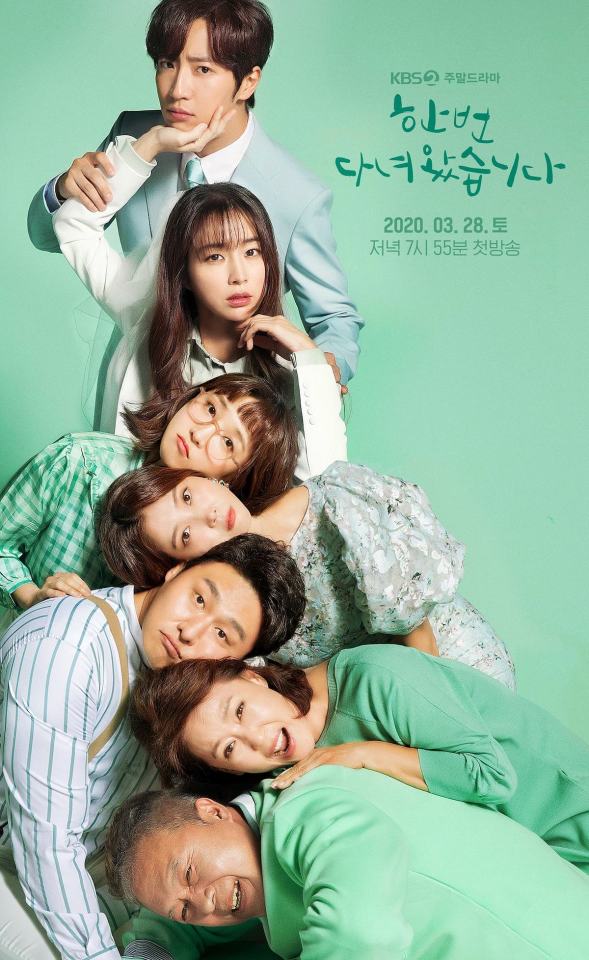
Arguably one of the weekend family drama KBS2 in a while that kept me waiting for new episodes in front of my TV. Some people are turned off by weekend family drama because they tend to have slow pacing which makes viewers feel like they are being dragged to one of those boring corporate events that you would rather miss and wish you could be literally anywhere else.
Because this drama had more pairing than the typical weekend family drama, the story did take some time before it was on full momentum. It did feel like the drama could have been better with even one less sibling to worry about, but it was a fun watch in the middle of lockdown.
Will I watch it again? I’d rather rewatch House of Bluebird (starring Lee Joon Hyuk and Lee Sang Yeob as friends to enemies to friends again) because that drama spoke to me in a way that was more relatable. No hate to Once Again though. I just prefer House of Bluebird better.
Note: Justice for Song Ga Hee and her lovely son, Kim Ji Hoon. He had to grow up so much because of what happened to his mother, that it broke Ga Hee’s heart. And mine of course
9. Secret Forest 2 (tvN)
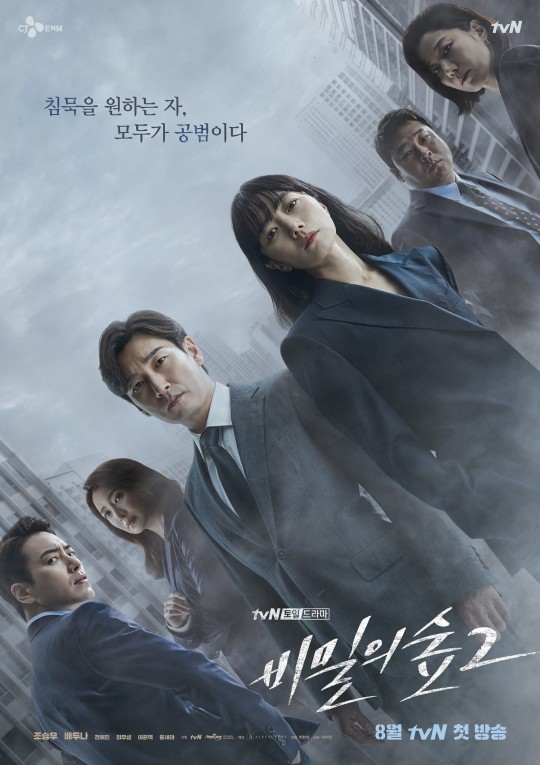
I watched Secret Forest once it has finished and I fell in love with the drama! Imagine my excitement when they announced Secret Forest 2 with my three main characters reprising their roles. No hate to Yoon Se Ah, I love her, but her screen time in Secret Forest was not enough to make me excited about her return. But I was pleased with her role in Secret Forest 2 and I hope if there is a third season, her character gets the redemption arc that she yearns for.
Secret Forest 2 was not as intense as the brilliant original, but I understood that it had to do with the overall theme of the season, and the theme required the script to be as such. Some people may argue me on this, but I still think what they pulled off was brilliant.
Too bad there was a severe lack of Lee Joon Hyuk on my screen though.
10. Tale of the Nine-Tailed (tvN)
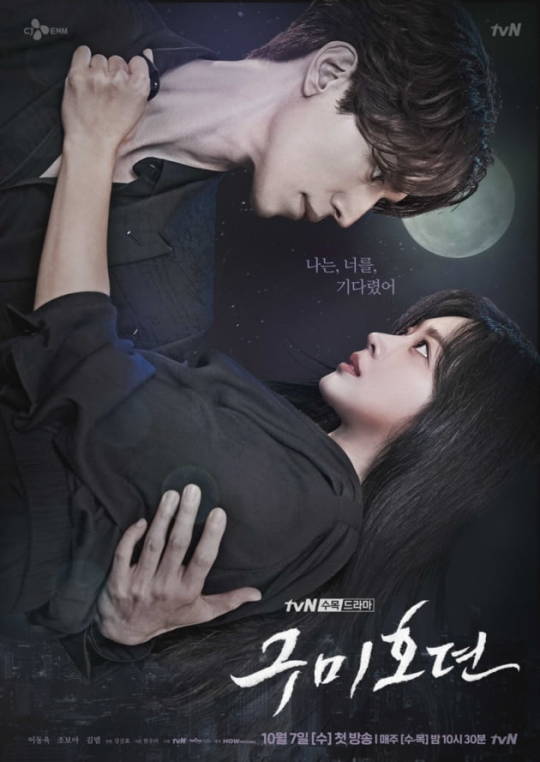
Well. This drama went far beyond my expectation. The OTP was to die for. No such thing as miscommunication trope. This drama did not waste time on unnecessary drama. The pacing was incredibly fast, even faster than Kairos. Although to be fair, Kairos had to play with two different timelines and required time to establish the setting.
I’m sad about what happened to Lee Rang, but he did what he did, and he would never be able to erase that much pain from his memory even if the deities decided to be lenient on him because of his roles in killing off Imoogi. A fresh start as a human seemed like a fair reset to his life, and I hope he lives well, surrounded by people who love him.
I was never a fan of Jo Bo Ah (no hate on her, I was just indifferent) but this drama opened my eyes to what an incredible actress she is. I wish her a successful career ahead.
#365 repeat the year#365: repeat the year#do you like brahms#do you like brahms?#flower of evil#into the ring#kbs memorials#mbc kairos#more than friends#oh my baby#kbs once again#secret forest 2#tale of the nine tailed#kdrama#kdrama review#kdrama opinion#personal#annual drama recap
69 notes
·
View notes
Text
Ya know thinking about it, maybe there’s nothing more to Syds weird amount of trust for Farouk than gullibleness and pride.
There seemed to be a pattern of her not really internalizing the severity of Farouks crimes, she mostly just thought of him as an “asshole” throughout all the seasons and not someone doing deep long lasting damage to the people around her.
In chap 11 when they find the music box David ask what it is she says, “Nothing just your asshole parasite messing with my head.”
As if its Davids fault Farouks evil, or as if Farouks only a David problem, and not ya know, an extremely powerful supervillain bent on world domination.
I’m trying to figure out what Syds perception of Farouk was, so lets look at their major interactions.
1. Discovers his existence, chap 5. She was wondering what the problem in her and Davids relationship was and now she has someone to blame. I’ll point out, it’s likely she was only thinking of Farouk as an obstacle in the way of her and Davids relationship, and not as a horrifying abuser who’s had a chokehold on David for his entire life. Now the “mission” is clear, snip Farouk outta Davids head, everything’ll be perfect.
2. David and Amys childhood home, also chap 5. Farouk jump-scares them a few times. And I think as far as Syds concerned, that’s a cheap trick. She sheds a tear but then puts on a brave face and keeps moving. Just a horror show after all. None of it “real”. But then Lenny actually jumps out and attacks her, telepathically ties her up then starts grotesquely kissing David while he’s unconscious. And the way she talks, I think Syd internalizes Lenny as being like... a jealous ex. The kissing, the “you stole my man” type language. Man, this relationship obstacle just won’t get out the way. And then...
3. Mental Clockworks, chap 5-7. In the white room Farouk reveals his true form and chases Syd down which scares the shit outta her. But, important note, he doesn’t actually touch her before the delusion is put in place. It’s still very much not real.
Anyways, what’s a horrifying display of control and power for everyone else worked a bit differently for Syd. She was the only one who noticed anything was off. And she couldn’t place it for a while, which worried her, and she eventually gets incapacitated by Lenny. But then, she’s woken up by Cary who takes her into a phone booth and tries to update her on what’s happening, only she’s already figured it out. I’ll point this out as a moment of overconfidence, she’s visibly proud that she was able to see through the illusion. She’s not like the others, she’s a hero archetype. And being that means when Cary hands her the glasses and tells her to go save the others she’s super confident in her ability to do so. She’s the hero after all. And when she does put on the glasses she remarks, “She thought it’d be more interesting.” She’s actively downplaying this nightmare. I don’t hold it against her but my point in saying all this is that it comes back later. This is another instance of her thinking Farouk’s “Not that big a deal.” Underestimating his abilities. I mean, she saw through it after all, she could probably do it again if she needed too... right?
To summarize 3, Syd sees herself as the hero who saw through Farouks cheap illusion. She feels stronger than Farouk here, like he couldn’t hurt her (really hurt her I mean) even if he tried. And in that, she can’t relate to the others who treat it like a big deal or like a traumatizing moment in their adventure. It was just a standard hero vs villain fight to her. Really hope the points getting across cause this’ll come up later.
4. White room, chap 8. Another interaction with Lenny only this time she’s on the ropes, looking a lot worse for ware. Syds not scared of her anymore, or so she tells herself at least. She saw through Farouks tricks. She can do it again if she has too. Nothings gonna get in the way of her and Davids happily ever after. Except Lenny has a good point... she’s still inside David. Still attached to his mind. She could explode his brain if they try to rip her out forcefully. And David can’t handle himself against Farouk, Syd knows this. Cause Davids never won against Farouk up to this point. Getting out of Mental Clockworks was a team effort from her, Melanie, Cary, and Oliver. If it hadn’t been for the crown they wouldn’t’ve gotten out of their. Syds role in this was to keep Kerry and Rudy safe until Cary could complete his end of the plan. And she did. But David was helpless in that, as far she knows. So she, the hero, needs to do something. Just sitting around isn’t good enough. So... she switches with David again. Using a true loves kiss too, a truly fairy tale worthy action, one for the books.
She’s fully possessed now, completely outta control of her own body, but Farouk only used her to get Kerry. It’s a very short moment for Syd, she might not even remember it. When she wakes up she says, “Did we win?” She honestly might’ve just blacked out after the kiss. Because they’re not telepaths their minds are probably much easier to push to the side than Davids. She might not’ve really... experienced the possession is what I’m getting at. And she’s once again most concerned with David.
D: “You should not have done that, as much as I like kissing you.”
S: “It would’ve killed you.” She says that last line not in a concerned way, but in a playful-ish way. As if to say “Obviously I saved you. I’d destroy the world myself if it meant saving you.”
Ya know what, I’ll point out here also that David once again failed to beat Farouk. Syd managed to get Farouk out of his mind but David still couldn’t stop him in the real world.
5. Plaque, chap 9. As explained in show, Syds been part of the team hunting down Farouk and trying to stop him from finding his body. Before chap 12 she and everyone else is under the impression that Farouk is the source of the “maze virus”. A psychological plaque that freezes everyone in their tracks and causes them to chatter their teeth. Disturbing, but... just based on other stuff we know about the character... she probably doesn’t care that much. Her main focus is probably still David. And when David comes back, she immediately blames him for disappearing. Her context here being that he was found in the club they followed Farouk to, next to a bunch of teeth chatterers mumbling, “Help them. Their in the maze.” Clearly, he’s been somewhat involved with the events of the past year, so why hasn’t he contacted her? Why hasn’t he included her in it? Why’d he abandon her? He says he doesn’t remember anything? Ptonomy says otherwise. Clearly he remembers something. He’s keeping secrets. She gets why from the others, but why from her? They’re supposed to be a team. And he abandoned her, to go clubbing with Farouk or whatever it is that he was doing their.
6. Music box, chap 10. Davids back. Maybe she can just pretend things are normal. He leads them to the middle of nowhere and they find her old music box. Farouk. That asshole. His little jump scares and memory tricks won’t get to her. He can’t hurt her, remember? This is all he can do. Illusions, trick. And she’ll see right through them every time. Besides, was reminding her of her childhood really the best he can do? Yeah she’s got a childhood, so does everyone. She’s over it already. (I’m starting to type more and more in Syds perspective.)
6.5 Syd the illusion breaker gets caught in the maze, chap 12. Only... she’s out of it before David even enters her mind to save her. She sees that he’s there, doesn’t know why, but decides to use this as an opportunity to teach him a lesson. We all know the lesson though. The headline in this particular case is, “David never saved Syd from her maze.” He never even saw it. She doesn’t know what he’s talking about when she mentions it. He entered her mind but she’s the one in full control. Scary good control even, props to her. The lesson she’s trying to teach him is sort of... her own thought process on heroism. “Love can’t save us, it’s what we have to save.” Up to this point “love” is all Syds been fighting for. It’s been the driving force behind her heroism. She’s done some messed up things in her past, sure, but all her problems only made her stronger. They made her the “truth seer” she is today. They led her to David, the best thing that’s ever happened to her. No villain can hurt her more than she’s hurt herself. This all... obviously doesn’t translate perfectly to David. That’s just... not been his experience.
(Skippable David Tangent) Farouk hurt David the most that any one person could. And David couldn’t hurt himself more even if he tried. And all Davids pain hasn’t made him mentally stronger, less gullible, or less sensitive. The opposite in fact. Davids minds been split, unbeknownst to Syd. He’s in a constant state of confusion. He keeps getting tugged around by friends and enemies and doesn’t know what to do about it. Davids pain hasn’t shielded him at all, just caused him more strife. He’s even still being manipulated by his abuser. The survivor story just doesn’t work on him, at the moment at least. As far as Davids concerned his “strength” comes from his powers, and he didn’t get a choice in those either. Syd doesn’t see any of this, she’s not a telepath. She hopes her story will help him but... it really only applies to her. Back into her perspective though,
7. Lenny’s back, chap 15. I know this isn’t a Farouk interaction but it is sorta important. Davids not listening to her. She’s trying to remind him of the mission, trying to keep him focused, but clearly it’s not working. Losing his sister really affected him. She understands sure, but he won’t even talk to her about it. Love is what’s supposed to be used to help each other through these dark times, to make sure people don’t feel alone. But he’s isolating himself from her. He isn’t “saving love” he’s pushing it away. That’s not what heroes are supposed to do. Farouk is once again in the way of their love. She can’t blame David, and she knows it’s not her fault, so Farouk.
But the headline there is she’s downplaying his sisters death. As if it’s just another trick to mess with him, an obstacle to be hurdled over. Like the music box thing. But... his sister died. In fact... Lenny was more immediately comforting to him about it than either of the Syds were.
Syd still isn’t internalizing the pain Farouks causing to others. All she’s internalized is her own wins against him and the fact that he’s never permanently damaged her specifically. Or so she says. He’s still just a ghost in a haunted house.
8. Lenny talk, chap 16. Syd comes over to gloat. She sees through Farouks trick. Lenny’s not gonna frazzle her, or David. She’s just another obstacle to their happiness. Only Lenny drops a hard truth on her. And Syd doesn’t seem to want to hear it. She’s stunned at. Tbh... I think she walks away deciding not to believe her. It must be another trick. She just said that to mess with her (again, Syds thoughts). She really really wants to continue thinking of Farouk as “just some asshole” who they need to work with and/or defeat so her and David can finally have their happy ever after. At this point, if she actually started thinking of Farouk as dangerous to her, as a major threat, it’d feel like giving him power. The power of fear, over her. She refuses to be afraid of Farouk, cause she knows that’s how he tricks people. That’s how he controls them. So she doesn’t listen to Lenny. She resolves to continue downplaying Farouks crimes. A dog barking in peoples ears.
9. The cave, chap 18. In between this and the last one David left her again. He really doesn’t get what “saving love” means. But she dedicates herself to him again. If he won’t save love, she will. She’s a hero after all. She’s beaten Farouk in the past and she’ll beat him again if she has too. And then... the cave. Incorporating what another fan has said, even if Syd does pic up on Melanie being Farouk, she knows her future self wanted to work with him for some reason. He was the key to saving the world. He may be a house haunting asshole, but if he saves the world, then there’s gotta be something more to him... right? Melanie complains about Oliver some more, she’s over it. But then Melanie starts showing Syd images. Syd doesn’t know how she’s doing that, but some of the images are from very private personal moments. And they’re all centered on David. These must be memories. Both her and Davids. How Melanie is doing this can go on the back-burner for now, what is she trying to tell her with these? That Davids crazy? No, Farouk’s the one who was behind all these things. Davids “her man.” Her one true love. The problem in their relationship has always been Farouk.
But then... there are all those moments after she got Farouk out of his head. Him keeping secrets. Him not confiding in her, or being there for her. Him constantly leaving her behind. That’s not how love’s supposed to work. A psychopath? Well, when you say that... and you show these images on the screen... and you show him torturing Oliver ( a victim) to get to Syd. And enjoying it, almost like he just wanted the excuse to go all out. Like it’s not really about saving Syd. Or love for that matter. Syd maybe admits to herself at this point that Davids fairly unhinged. He’s had a rough childhood though, there were bound to be some sharp edges here and there. He tortures Oliver for a long time though. And it really starts to feel like he just likes doing it, not that he’s doing it cause it’s “necessary”. It doesn’t even work.
And then... Melanie shows her Future Syd. She matches the description David gave her. And there’s David, in those same pajamas he wears. And... he’s kissing FS. He didn’t tell her about that. It’s not cheating cause it’s her future self. But... they talked about this. David was the one to say it might feel weird. Why not tell her? Why keep that a secret. Even if it’s not cheating, it certainly feels like it. It’s a huge betrayal. And he doesn’t have Farouk as an excuse. Davids just... a bad person. She’s starting to piece together the point of all this. “Legion, The World Killer” yada yada.
David hasn’t been loyal to her. He hasn’t saved loved, he’s not going to save love. The path he’s on is dark and selfish. Could he destroy the world? They’ve known he could since season 1. They never thought he’d actually do it. But wait no, you can’t give up on love that easily. He’s a good person. And then Melanie shows it all again. And she shows him kissing Lenny. And she shows FS telling Farouk about David. And Syd can’t help but concede. Davids too far gone. Farouk may be an asshole, but David lied about everything. He lied to Syd. Again, Davids not going to save love, he missed the mark on that. Davids going to end the world.
Very important to point out here, as I’ve tried to build it up, Syds internalized herself as a hero who doesn’t let anything get to her. Farouk can’t hurt her with his illusions and tricks. She’s seen through them before and she’ll do it again. But David betraying her? Keeping secrets? Playing with her heart? That hurts more than anything Farouks done to her. She invested in David. She was on his side no matter what, but he wasn’t on her side. So if FS says Davids evil and has gotta go, than she’ll believe her. He’s gotta go.
All of this hopefully explains my theory on Syds specific moment-to-moment reasoning thoroughly
I also wanna say though, if I’m right this makes Syds moment on the mountain make more sense. All the specific unexplained discrepancies.
She says she knows it was Farouk who showed her all that. Because she doesn’t perceive Farouk as that big of a threat and again, as mostly a house haunter. Those were clearly memories, she doesn’t care that the infos coming from him, and she believes she can tell the difference between an illusion and something real. so Davids gotta answer for that.
She gets a detail wrong, she says “He went to see her, after you quit.” But we all know he saw her before David quit and specifically set him up. Syd doesn’t know David specifically broke their rules after they set them. She thinks he kissed her beforehand and didn’t tell her for whatever reason.
And again, she doesn’t fully understand what everyone around hers been through. Hence, “The son of sam” thing. To her, Farouk maybe evil, but you can see through his tricks if you just try hard enough. Even though he possessed her she didn’t really register it happening. At a certain point the things you do when he’s in your head are on you (says Syd).
Oh, and also majorly, the “Farouk, your enemy” thing. She never really care about him all that much. He was just an obstacle. David was the one who had a weird complex about him.
Tl;dr Syd doesn’t view Farouk as much of a threat. She doesn’t register or internalize the pain he’s causing to the others cause he’s not doing any of it to her. Syds main focus is David and when she realizes what Farouk’s showing her are memories, and that David’s betrayed her and isn’t planning on “saving love”, that hurts her more than anything Farouks done. Thus, she turns.
18 notes
·
View notes
Note
You said in your tags of one show analysis that you had thoughts about the Darkling's manipulation in the books. Care to rant? All the fandom seems to angry that he is a master manipulator in the books but when I read I was like: lol what?
Thanks for your ask! I’m extremely happy you want to hear my rant!!
I will try to gather all my thoughts, but apologies in advance if it all comes out as a jumbled mess. Though in my defence, the trilogy itself is a jumbled mess too 😂
(Under a cut because I got carried away)
After reading the trilogy I also wasn’t sold on the “manipulation” narrative. At least, I could not find any effective manipulation in his actions. He’s centuries old, the most powerful Grisha in the world, and we are told he’s evil...I’d expect when he wants to manipulate someone he’d do it...well?
First, there’s the issue of the Darkling seducing Alina in S&B. This is what I disagree with the most. For the life of me I can’t see where he seduces Alina in the first book. He’s hardly in the book at all. If what he did is considered seduction, then my boy’s game is weak.
Here’s a passage from S&B after the Winter’s Fete when Alina begins to realize the Darkling’s ‘manipulation’, it really surprised me.
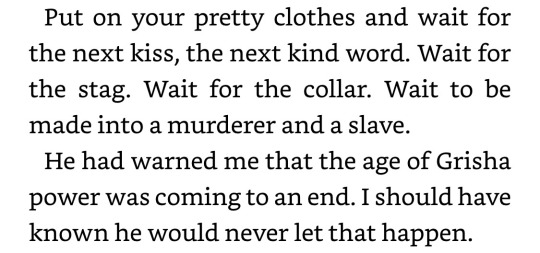
The first time I read this, it thought this was a sudden, overblown reaction. Going from this one would think the Darkling was playing the part of an emotionally abusive boyfriend. A boyfriend who showers you with attention, and promptly starts ignoring you when you don’t act the way he wants you to.
When in reality that really—never was the case? The Darkling’s first kiss was written as an accident. Throughout the trilogy, it’s made clear that the Darkling wants Alina against his own better judgement. Then how can the romantic tension between them be another aspect of his manipulation?
One of my biggest problems with the trilogy is that it keeps contradicting its own narrative from time to time. Because then there’s this in R&R:

Which implies his romantic attention indeed had an ulterior motive? But then he wasn’t really good at it, was he? I can think of a hundred better ways to seduce a girl (who is already attracted to you), than to kiss her abruptly once, apologise, and then run away to hunt a stag for a few weeks!
Now let’s look into his actual motives and actions. He’s a General in charge of the an army created out of a group of persecuted people, and he’s serving a selfish uncaring King. He’s an immortal who accidentally created the Fold when trying to use merzost. He has a secret plan of expanding the fold in order to gain Ravka military advantage. He needs the help of a Sun Summoner in order to do that.
He meets one after centuries, makes her a part of the Second Army, has her trained by his mother, plans to give her the world’s most powerful amplifier. In order for his plan to work he needs her completely dedicated to the Grisha cause and her newfound powers, and facilitates this by intercepting letters to her childhood friend. And for the most part, he’s right. Mal is the reason Alina represses her powers. And the first time she actively summons is after she decides to let Mal go.
Sure by modern standards this is grossly manipulative. But in the context of a war torn nation? Where oskazat’sya teens are drafted to the First Army and Grisha into the Second Army? Where the Grisha are burned and experimented upon? In the context of THAT grim and dark world all of Darkling’s actions look like war strategy, not manipulation. Alina is a powerful weapon for Ravka, no matter how much she personally dislikes that role.
The Darkling’s intention I think was to develop Alina into a loyal soldier. It’s even implied that had she not run away he intended for her to kill the stag and keep its powers for herself. How he planned to get Alina’s cooperation to help him expand the fold is something we will never know. But I bet he hoped to have secured Alina’s loyalty to the Grisha by that time.
The attraction was an unexpected hindrance, one he clearly didn’t want. I think he was too swayed by the idea of another immortal who could be his companion for eternity. I think this yearning blinded his better judgement and led him to make very dumb decisions whenever it came to Alina. At the very least he did a terrible job in actually manipulating Alina into trusting and relying on him. Because at no point in S&B does Alina trust him or rely on him. Even as she’s contemplating sleeping with him, she believes it was not more than an attraction from the Darkling’s side.
LB tried, but I simply don’t see the Darkling as the villain she intended. His motives are way too sympathetic for me to do that. As for his his monstrous actions in Book 2 and 3...they seem more like things specifically inserted for the readers to hate him than things that logically made sense for him to do as a character 🤷🏽♀️ But that’s just my opinion!
So in conclusion: is Book!Darkling manipulative? No, I don’t think he is. I do think he’s strategic, just as any General planning a coup on behalf of the Grisha would be.
I also think he could have been successful in his plans to expand the fold had he truly tried to manipulate Alina from the very beginning.
Which he didn’t. Sadly.
#master manipulator yeah right#he’s a puppy with a crush when it comes to alina#the Darkling#pro Darkling rant#shadow and bone#siege and storm#ruin and rising#my first ask yay
12 notes
·
View notes
Text
16 new horror films i’ve watched at random lately just cause i’ve been in the mood for horror
Been thinking about horror today, and fun fact, I’ve actually been fairly DEVOURING horror films of late! Sixteen new ones in the past couple weeks, in fact, according to the little list I’ve been keeping! New to me, that is, though they do all happen to be very recent releases (2016 at earliest). Horror is a genre with which I often like to pull up Netflix or Hulu and just pick at random some film I’ve never heard of and don’t know the first thing about; I feel like it’s a genre that depends so much on personal taste and that encompasses such a wide variety of tropes and approaches that I never entirely know whether I’ll like a particular film until I try it. It’s a gamble, sure, and sometimes it’s a dull or infuriating couple hours... But I love horror in general, and I feel like it’s a genre in which even terrible films often stir my imagination with the potential of their premise if not the brilliance of their execution. And you do find those hidden gems.
Anyway, since I love to hear myself talk, I thought I’d share my quick impressions of the ones I’ve watched lately, in case any of you are also in the mood to stream something new! These are (almost) all currently on Netflix or Hulu, so have at it. No specific spoilers; mostly just whether I liked it or not and why. I added a few content warnings where I remembered any elements that, to me, went beyond genre-standard levels of content or involved specific common triggers, but, I mean, they’re all horror films, so do your due diligence if necessary and do expect some level of violent or disturbing content in all of them.
The sixteen films in question are: Sweetheart (2019); The Lodge (2019); Mercy Black (2019); What Keeps You Alive (2018); Cold Skin (2017); The Golem (2018); Rattlesnake (2019); We Summon the Darkness (2019); The Wretched (2019); They Come Knocking (2019); Pyewacket (2017); The Other Lamb (2019); The Silence (2019); Body at Brighton Rock (2019); Under the Shadow (2016); and Seven in Heaven (2018).
Brief descriptions and impressions and such under the cut!
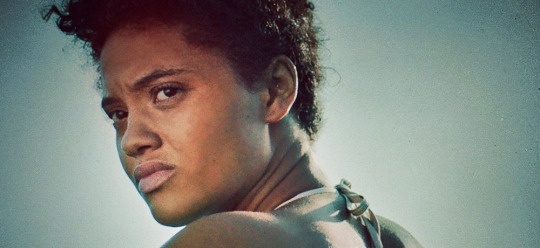
Sweetheart: Survival/monster horror about a young woman who, after the boat she and her friends were on goes down in a storm, washes up alone on an uninhabited island… and then realizes she’s not entirely alone. Quite liked this one! Like almost any horror movie, it suffers from the fact that monsters are almost ALWAYS far scarier (and far less cheesy) before you actually see their CGI rendering chasing the protag, but that’s typical, we’re used to that. The protagonist is smart and capable, and the actress (Kiersey Clemons) has to carry so much of the film solo and often with very sparse dialogue. Warning for mutilated and decomposing corpses.

The Lodge: A woman who as a child was the only survivor of a cult winds up stranded with her new fiance’s two children in a remote, snowbound lodge. This one was pretty dark! I love themes of cold, isolation, and losing connection with reality, and I think the whole cast does a great job; the acting and production are overall high quality. Not sure it captured my imagination enough for a rewatch, but I did enjoy watching it. My fellow Barkskins fans will notice a few glimpses of our own Renardette. Warnings for onscreen suicide, pet death, and psychiatric/medical manipulation.
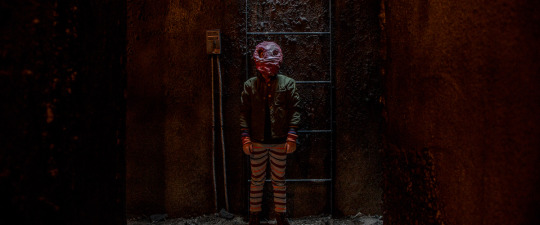
Mercy Black: A young woman returns home fifteen years after, in her childhood, being involved in a disturbing act of violence inspired by an urban legend called Mercy Black. I like the concept behind this one, in terms of the urban legend, the protagonist’s relationship with it; I liked the overall film okay, but I found certain aspects a bit cliche or thinly sketched. Standard supernatural horror levels of violence and spookiness, imo.

What Keeps You Alive: For their one-year anniversary, a young couple vacation to a remote house in the woods, where the protagonist begins to learn some strange things about her wife. I really enjoyed this one. It might be my favorite on this list, and certainly one of the ones I’m more likely to watch again. It’s well structured, well made, with a strong, compact cast, and it’s gotten the song “Bloodlet” stuck in my head for weeks. However, you will probably not enjoy this one if, as I know is the case for some people, you would rather not consume content that depicts LGBT relationships that are unhealthy or LGBT characters who are villainous. I get where you’re coming from, but it means this one probably isn’t for you. It also isn’t for you if you would rather not see some quite brutal injuries.

Cold Skin: Okay, this is the only one that wasn’t actually on streaming, I checked this out from my local library. Set in 1914, a young man takes a post as a meteorologist on a remote island in the South Atlantic, inhabited only by the unfriendly lighthouse keeper… and the creatures that crawl onto shore at night. Gosh… How do I feel about this one? There are aspects that are cheesy, effects that don’t entirely hold up. But I liked it. I like the idea of it, and I like the themes of isolation and connection, and I like the protagonist and overall I think it’s a solid and interesting narrative. Sort of… The Terror meets Lovecraft. Warning for offscreen (but audible, and almost visible) sexual assault.

The Golem: Set in the late 17th century in a rural Lithuanian shtetl, a woman creates a golem to protect her community from the threats of Christians who blame her people for the plague. Thematically, this one centers largely around motherhood, which I think makes sense with how it’s done here, and I always like the supernatural elements of a horror film to have a very strong, personal thematic link with the protagonist’s emotional character arc. Stars Maman Brigitte from American Gods! Warning for mentions of miscarriage and themes of child death.

Rattlesnake: After a mishap on a remote highway, a woman unknowingly makes a deal with the devil in order to save her young daughter’s life. I liked this one as well; I found the protagonist enjoyable, the overall concept straightforward but engaging, and the hot, arid, rural setting — I think it’s supposed to be around Palo Duro? — an effective backdrop. Not spooky-scary, but nice tension throughout.
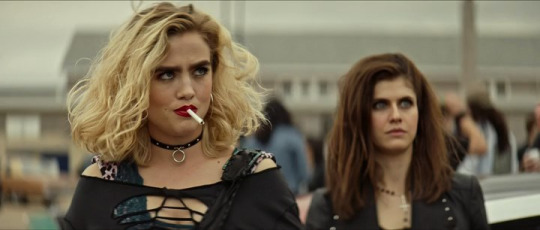
We Summon the Darkness: Set in the 80s, three girls travel to a heavy metal concert despite the string of recent killings apparently committed by a Satanic cult. This one is basically a slasher flick — with a twist, yeah, but essentially the slasher model of teens plus extensive violence — and I think it’s a pretty decent one. And I liked the hair and costumes, ahaha.
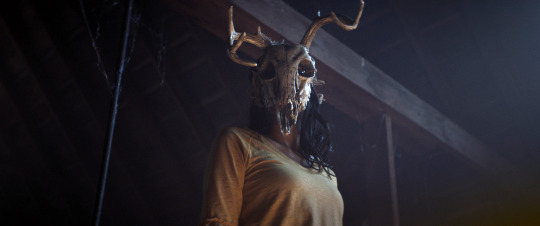
The Wretched: A teenage boy becomes convinced that his new neighbor has been possessed by something evil. I like the narrative and the characters in this one okay, but where I really have to give it props is in the overall visual presentation of the supernatural threats; it’s able to lean into uncanniness and human body horror that work well on film rather than presenting a creature created wholecloth (which, as I mentioned earlier, often doesn’t work super well).
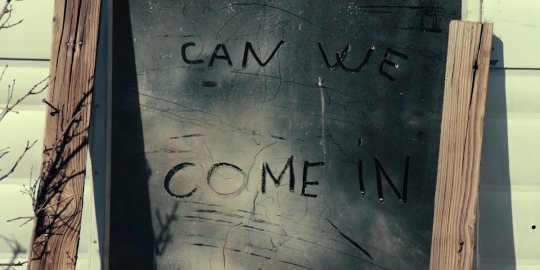
They Come Knocking: On a drive into the middle of nowhere, a father and his two daughters hear something knocking on their caravan at night, asking to be let in. Okay, so… this one is a black-eyed children story (with a setup reminiscent of ye olde Anansi’s Goatman, too, in a way), and I have to admit that black-eyed children are one of those tropes that doesn’t work for me even as a creepypasta, it just strikes me as lame and dumb. And I did find the actual children in this film to be, well, cheesy and dumb-looking. But the human side of the narrative — the characters and their relationships and emotional aspects — is actually pretty well done! So I found it engaging enough in that regard.
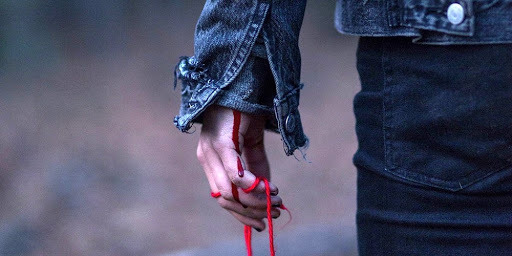
Pyewacket: A teenage girl who has a difficult relationship with her mother lashes out by trying to summon a demon to kill her, only to regret the ritual right away. I think this one was well done, too, pretty dark, with a spooky forest setting and some genuinely creepy glimpses of the supernatural threat. I am also delighted to discover that Pyewacket is actually the name of a familiar spirit according to the confession of an accused witch in the 17th century. (Not delighted by the fact that this poor 17th century woman was tortured for being an alleged witch, but delighted that there’s a little historical inspo here.) Warning for a fairly graphic death by burning.

The Other Lamb: This one is not horror as in “scary” but horror as in thematically disturbing and a little eerie. A young girl who’s been raised in a cult — all female except for their leader, to whom all the members are either wives or daughters — begins to question her faith. Slow, quiet, and a bit surreal, with some slightly feral-woman themes that are up my alley; I think I enjoyed it? The cast is quite good, especially the protagonist (Raffey Cassidy) and cult leader (Michiel Huisman with, I gotta say, some truly lovely hair). Warning for onscreen but nongraphic (as in, clothed and not showing anything below the neck) sexual assault of a minor.
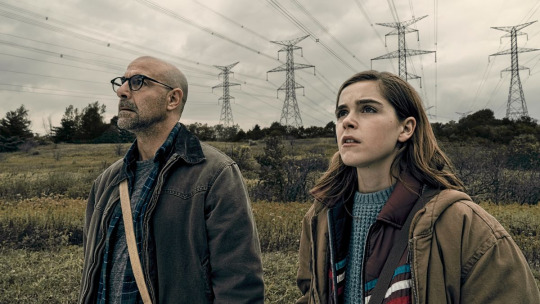
The Silence: A deaf teenager and her family struggle to survive amidst an apocalypse of deadly monsters that attack based on sound. No, I’m not talking about A Quiet Place. I do feel a bit sorry for this film, because I know that it was conceived of and began production well before A Quiet Place came out, only to essentially be doomed by its striking similarity to such a successful film… And honestly, it’s not as good as A Quiet Place; it’s cheesier, there are more plot and character holes, the ultimate main threat feels disconnected from the premise, and the core theme/character arcs aren’t as cohesive. But it’s not TERRIBLE. It’s more of a B-movie-esque monster/disaster flick, is all. And I like Stanley Tucci, so at least he’s always fun to watch.
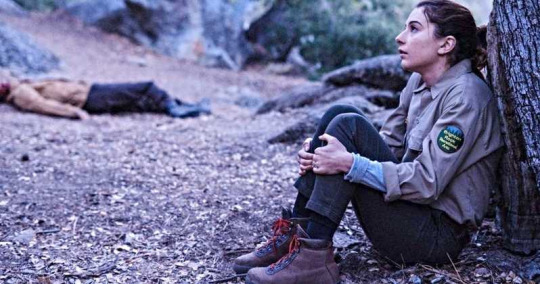
Body at Brighton Rock: An inexperienced parks employee gets lost in the backcountry and has to spend the night watching over a (possibly murdered) body she stumbles across while awaiting rescue. This one… hm. It’s like, I didn’t hate it? But it was frustrating. It reused the same scares / fake-outs multiple times, and even by horror movie standards the protagonist was maddeningly careless. I think it was all the more disappointing because I do like the setting and premise but felt it could’ve been better.

Under the Shadow: In 1980s Tehran, during the air raids and missile strikes of the War of the Cities, a woman begins to fear something evil is stalking her young daughter through their emptying apartment building. This is another top fave, and I think overall the most well constructed film on this list in an objective sense. Strong narrative, strong characters and acting, a really great atmosphere of claustrophobia and tension and dread, and an interesting and effective setting. Would absolutely watch again.

Seven in Heaven: At a house party, two teenagers enter a closet as part of a kissing game, and they exit into a parallel universe that is similar but different in striking ways. This one was, hm… okay? I felt like it could’ve gone so much farther with the potential of alternate universes, in terms of really making them weird and interesting, and although I don’t expect a film to spell out everything for me, I just thought that the whole underlying mechanism of what was happening was left too unexplained. Also, the background characters looked like they were played by actual high school-age teens while the main characters looked like your standard Hollywood 20-something “teens,” which created kind of a weird dissonance lmao. But it was okay.
Overall, I didn’t HAAATE any of these; most were fine, some I found less engaging or more frustrating than others, and some I really enjoyed. I did start and then not finish a few more as well... I watched about 20 minutes of Black Rock (2012) before deciding I wasn’t in the mood for where it was going, and I just barely started We Are What We Are (2010) but realized I was too tired and distracted by other things to pay enough attention to subtitles at the moment. On a not strictly horror note, but it’s still thriller so we’ll toss it in, I got a ways into The Killing of a Sacred Deer (2017) because that’s a helluva title and I wanted to see Barry Keoghan’s work outside Dunkirk (the only film I’d seen him in), but man, that’s a weird one huh, very slow, very odd style of dialogue. I’ll still likely finish some or all of those at some point, but I just wasn’t in the right headspace when I first tried.
Anyway, this has been me telling you what movies I’ve been watching! I’m sure you’re enthralled. And please always feel free to talk horror movies to me or send me recs!
#horror#film#film recs#sweetheart film#the lodge#mercy black#what keeps you alive#cold skin#the golem#rattlesnake film#we summon the darkness#the wretched#they come knocking#pyewacket#the other lamb#the silence#body at brighton rock#under the shadow#seven in heaven#op
92 notes
·
View notes
Text
Tangled Salt Marathon - Painter’s Block

Once again, we have a decent episode that winds up falling apart in context of the wider story arc.
Summary: Traumatized after the previous events, Rapunzel is feeling out of sorts, even having trouble painting again, and starts taking a class with a mysterious new art instructor. The other members of the class disappear one by one to a mysterious location by the sea, apparently painting an old, withered tree. The instructor is revealed to actually be an old witch serving Zhan Tiri (the monster who released the blizzard), released after the use of the weather machine and wishing to release her master as well. It’s up to Eugene and Cassandra to rescue Rapunzel.
Tonal Dissonance Is a Problem
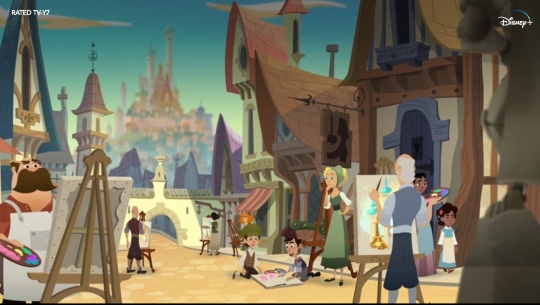
We start this episode with a recap of Queen for a Day and then we jump straight into yet another festival.
Ok, ignoring that clearly a lot of time has past and no one hasn’t done anything to help Varian nor even mentions helping him; it’s just aggravating to switch from a serious storyline back to a supposedly low stakes situation without resolving the first arc properly. Yes, levity is needed to break up tension, but not in a way that distracts entirely from the narrative.
Rapunzel Doesn’t Even Bother To Think About Varian When She’s Having Her PTSD Flashback
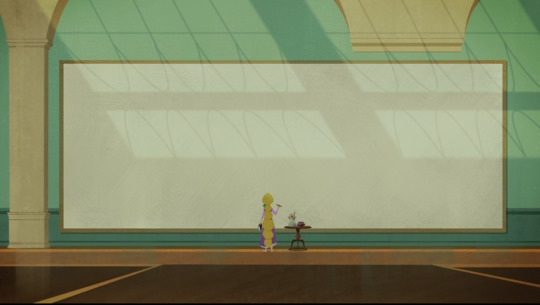
Its a minor thing, but throughout the episode Rapunzel keeps having dissociative moments as she constantly hears voices in her head as she remembers the storm. Now I actually do appreciate what the writers are trying to do here. As some who also struggles with Complex-PTSD and dissociation, it's nice to see it represented here in some way. However, the fact that they leave out the key part of her trauma, letting down Varian, undermines these moments. Especially when they had no problem using Varian’s voice clip of “You promised!” earlier in the recap. It’s one of those things you may not notice it at first, but once you do it winds up distracting from the scene.
What an Odd Place to Make This Reference
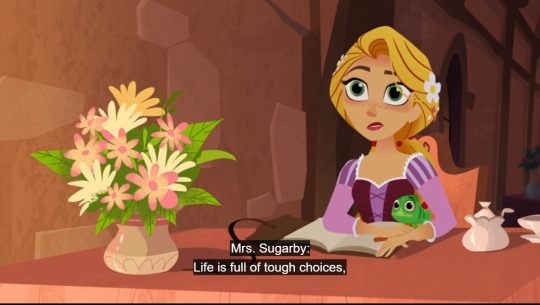
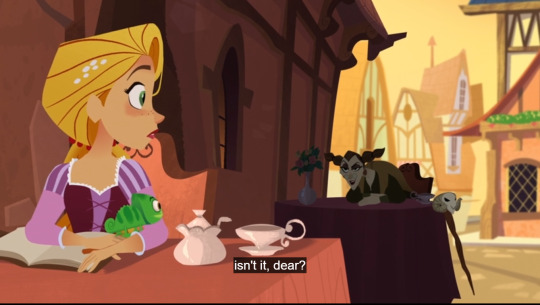
Sugarby is quoting Ursula here, but I honestly don't know why. Ursula’s actual VA, Pat Carroll, does appear in this episode but she plays Old Lady Crowley instead. Sugarby’s VA is Ellen Greene, of Little Shop of Horrors fame. (and Rock-A-Doodle) You’d think a quote from that movie would be more apt. Also Rapunzel was admiring everyone elses work right before this, not talking about tough choices.
Yet Again Cassandra Gains What She Wants, But the Narrative Refuses To Remember It
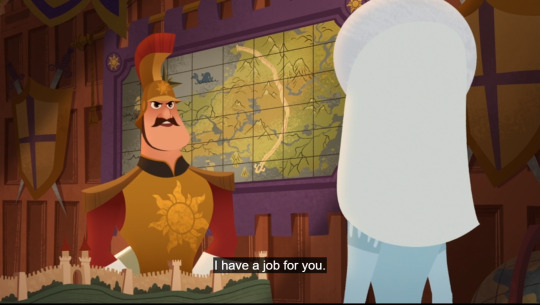
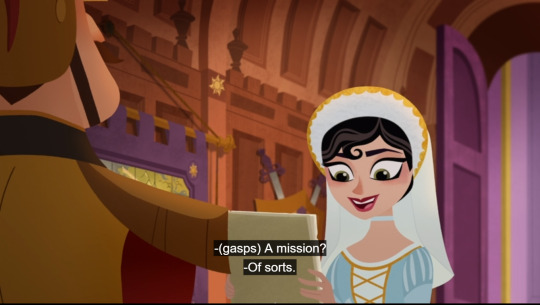
Cassandra’s beef in seasons two and three is apparently no one notices her or gives her credit for what she does, yet in season one she gets tons of recognition. Like here for instance, when her dad gives her a detective assignment on a missing persons case. To her specifically. He doesn’t ask anybody else first and isn’t running low on troops.
You can’t have one of the main characters achieve their goal on screen several times and then act like they had never achieved it in later seasons. The audience isn’t dumb. We’re going to remember what happened and it’s insulting to the viewers for the narrative to pretend like what we’ve seen just didn’t happen.
Friedborg is Wasted Here
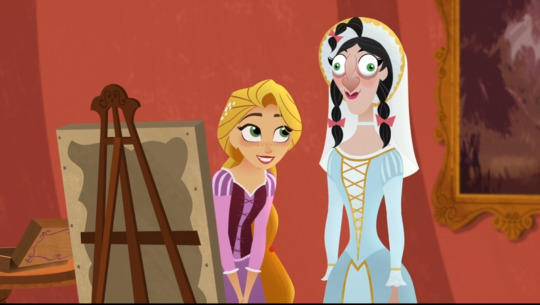
I’ve talked about it before, but Friedborg is an unnecessary addition to the cast. However I bring it up again because this episode could have been the perfect set up for making her plot relevant. There’s tons of unintentional moments within the episode that could have easily served as foreshadowing that could have connected her to Zan Tiri, more so than any of the other characters.
Trauma is an Explanation, Not an Excuse
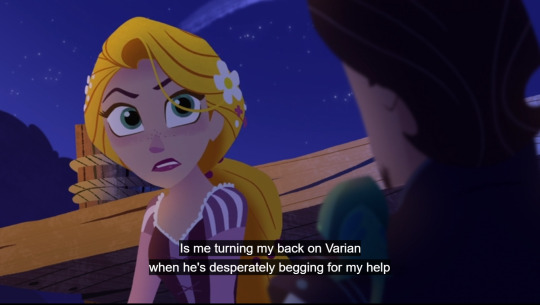

This episode presents the idea that Rapunzel is procrastinating helping Varian because she’s reluctant to face her trauma. Which isn’t excusable. It gives reasons for her actions but those reasons are still ultimately selfish.
Now, had the show owned up to this mistake, I would have no problem with using it as a point of conflict, yet the show constantly excuses Rapunzel’s behavior here. In fact the show excuses the behavior of several characters with the idea that so long that they had a traumatic backstory, they’re justified in their horrible actions. All but Varian, which a big double standard.
However, and I can’t stress this enough, trauma is never an excuse for harming others. Especially people who've never done you wrong.
Rapunzel spends several episodes ignoring Varian’s problem, long past the point of acceptability. And if viewed in the intended production order, the amount of episodes doubles. Varian is left alone for months, given the timeline of the show, and yet Rapunzel, the supposed adult in this situation, is never held accountable for neglecting a child.
Xavier isn’t Tied Into the Plot Properly

Xavier just so happens to have a convenient spell book that also just so happens to have all the exposition on the big bad that’s needed. It’s never explained how he got this book, why he has it, nor is it ever used outside of the first season.
Xavier is plot important as the exposition fairy but the show never explorers him further than that and doesn’t tie him into the narrative properly, even though there’s plenty of reasons to do so. In fact Xavier will become just as useless as Monty by the time season three rolls around, even though he previously had the most connection to the ultimate villain.
The Disciples Plot Goes Nowhere

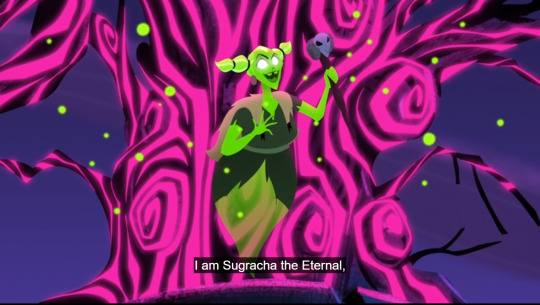
Ok, first off we get no real explanation as who these guys are, nor why they follow Zan Tiri to begin with. Why do they want Zan Tiri freed? What’s in it for them precisely?
Second, what meminal backstory we get on these guys, contradicts what we’re told about them here. Xavier calls them evil spirits, but later we find out that they were actual real people who onced lived. You could call them ghosts if you want to, but that begs the original question of why they followed Zhan Tiri in the first place and why they continue to do so even in the afterlife. Simply being ‘evil’ no longer cuts it because real people aren’t just purely ‘evil’. They have goals and motivations.
Finally, they accomplish nothing. They never wind up freeing their master. That happens through other means. They never connect back to Zhan Tiri’s own goals and motivations. They don’t add backstory to any of the other characters nor expand the mythos of the series. They’re just there to be a baddie of the week, and it’s is such a let down given what other hints we got for them.
Sugarby Misgenders Her Master

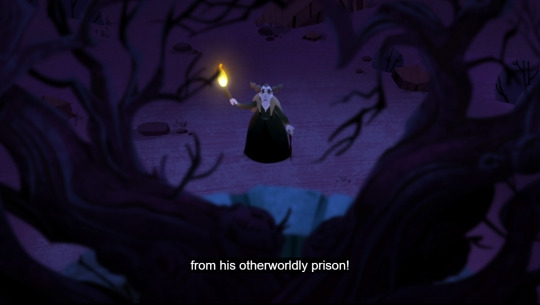
So it’s clear that the writers did not fully figure out Zhan Tiri’s plot before they started making episodes. Given how animation works and how much pre-production time you’re given before you ever even start animating (which is several years btw), that’s a sign of mismanagement right there.
Zhan Tiri is revealed to be a girl, but is referred to using male pronouns until that reveal, even by people who very well should know better, like her disciples.
Also all these tree metaphors and hints come to nothing either, as Zhan Tiri is ultimately both freed and imprisoned without them. So what was the point here?
Rapunzel Doesn’t Learn Her Lesson

This episode is suppose to be about Rapunzel learning to accept responsibility and owning up to her decisions even if it's hard. This should, sensibly, end with her taking upon her responsibility for Varian and following up with him. But no, we get a painting party instead.
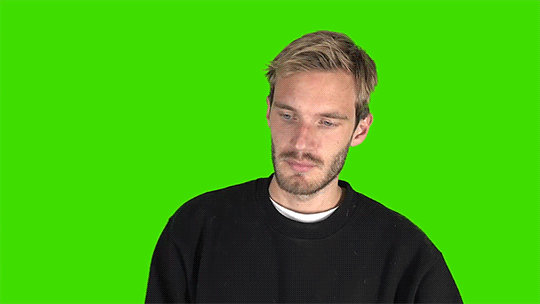
This isn’t Proper Foreshadowing
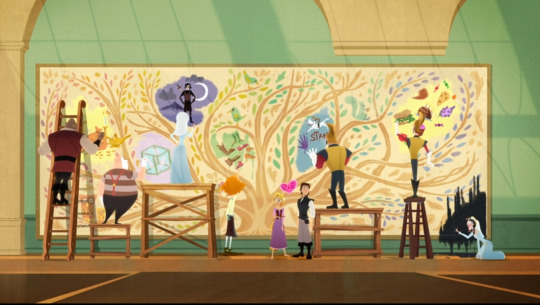
So everyone acts like this painting of Cassandra in front of the moon is foreshadowing for her taking the moonstone, but it’s not. Not good foreshadowing, anyways.
For starters, it’s not focused upon. Everyone is also painting stuff and crowding out what she’s doing so your eye isn’t lead to her
Nothing anybody else paints is a hint to anything later on, so why should the viewer pick up on this? It’s just a thing anybody could paint. If anything, Freidborg painting the void over there could have been some real foreshadowing cause that’s different and stands out, but it isn’t.
It’s not on screen long enough to register for the audience. If you’re only going to notice something after the fact then it’s not a meaningful clue. Real foreshadowing has to be detectable and the audience needs to be able to plausibly figure out a twist before it happens or you’ve got a bad twist that’s not integrated into the story.
There’s no other evidence to backup the twist. All we get is one framing shot of a mirror and that brief talk with Eugene in in the cell in Cassandra vs. Eugene. That’s not enough. And no, Chris claiming her ‘dress is blue’ as a hint is utter bullshit, cause there’s Freidborg right there wearing the exact same dress.
If MoonCass was always a thing that the writers intended to happen, which we do have evidence for given released production artwork and Chris’s own discussions about the show’s development, then they needed to put more effort into establishing the character and setting up her arc.
The very fact that viewers can easily pick out supposedly non-existent ‘hints’ with other characters like Freidborg and Varian, but not pick up on the actual twist, means that the writers failed to communicate clearly with their audience. That is on them and not the viewers, no matter what Chris says.
Conclusion
This episode is frustrating. Much like the pilot, it offers up good ideas but then never properly follows up on them. To make matters worse, it winds up distracting from the plot that viewers actually care about rather than furthering.
#tangled the series#tangled#rapunzel's tangled adventure#anti-tangled#zhan tiri#rapunzel#anti-rapunzel#cassandra#varian
74 notes
·
View notes